Bavarian rhapsody
The inside story of Vajiralongkorn's life in Germany, his unexpected 13 months in Thailand, and his return to Bavaria.
My work is fully funded by my readers. If you find my articles useful, please subscribe, it just costs about the same amount as one meal a month, and your support allows me to keep doing this work.
Thank you 🙏
At 17 minutes past two on the afternoon of Sunday November 7, Thai Airways flight TG924 took off from Suvarnabhumi Airport to the east of Bangkok and swung southwest out over the Gulf of Thailand before making a sharp turn northwards.
The six-year-old Boeing 777-3D7ER, with tail number HS-TKY, is currently the newest and most luxurious airliner in the ageing fleet of the bankrupt national carrier, with capacity for more than 350 passengers. Even amid the curtailed flight schedules of the coronavirus era it is regularly in the air servicing the most prestigious Thai Airways long-haul routes. It is the flagship plane of the airline.
But today, the airliner was empty apart from a few crew, and the destination was much closer to home.
As it approached the old Siamese capital city of Ayutthaya, the airliner made another sharp turn, swooping back southwards towards the northern suburbs of Bangkok. It landed at Don Mueang International Airport at 2:39 pm after a flight of just 12 minutes.
Thai Airways had flown a Boeing 777 almost 200 km just to get to an airport 30 km from where it started.
The main runway at Don Mueang wasn’t even supposed to be open. The Civil Aviation Authority of Thailand announced on October 21 that runway 03L/21R would be closed from November 3 until February 23, 2022, for surface maintenance.
Airport staff at Don Mueang were informed the previous day that the runway would temporarily reopen on November 7/8 and scrambled to get it ready.
The reason for all this expense and inconvenience, suspending essential maintenance work and flying a Boeing 777 nearly 200 km between two airports only 30 km apart?
King Vajiralongorn was going back to Germany, and he wanted to fly from Don Mueang.
Suvarnabhumi Airport is 35 km from the Amphorn Sathan Palace complex where Rama X spends most of his time when he’s in Thailand. Don Mueang is about 8 km closer. Vajiralongkorn was due to depart after midnight in the early hours of November 8, and traffic is halted to allow royal convoys to speed through the streets, so flying from Don Meuang rather than Suvarnabhumi saved him about four minutes of travel time.
Another reason that Vajiralongkorn favours Don Mueang is that a couple of decades ago the Royal Thai Air Force built a special building at the airport for his personal use. His mini-palace at Don Mueang can be see on Google Maps here. It is located at Wing 6, the military area of Don Mueang, where the king’s Dechochai royal flying unit is based.
It is adjacent to the main runway, and has a garden and outdoor swimming pool. Like many of Vajiralongkorn’s palaces the garden appears to have an old plane as an ornament — in this case, one of the F-5 fighter jets he used to fly. About a decade ago a special bicycle track was even added around Don Mueang and the vicinity for the exclusive use of Vajiralongkorn once he became obsessive about cycling.
When the king travels between Thailand and Europe he always demands to be taken on HS-TKY. It’s his favourite long-haul plane in the Thai Airways fleet.
It remains unclear why he chooses not to fly aboard the Royal Thai Air Force’s special VVIP plane, an Airbus A340 with tail number HS-TYV, which is specially designed for luxury travel while HS-TKY is just a standard Thai Airways passenger airliner, and doesn’t even have any first class seating, only business class and economy. Prince Dipangkorn is usually ferried between Munich and Bangkok on HS-TYV when he has school holidays. But Vajiralongkorn prefers the Thai Airways plane.
Here’s HS-TKY on the tarmac at Don Meuang after arriving on the afternoon of November 7. Vajiralongkorn’s mini-palace is the white building at the centre of the image.
A few weeks earlier, palace sources had alerted me that Vajiralongkorn would be going back to Germany on the night of November 7/8.
By Friday November 5, several more high-level contacts were confirming the information, and two of Vajiralongkorn’s three personal Boeing 737s, with tail numbers HS-HMK and HS-CMV, were airborne and on their way back to Europe. They tend to travel ahead of the king by a couple of days when he makes extended trips between Thailand and Germany. Because they can’t fly all the way directly, they made a refuelling stop on their way back to Munich on November 5, one plane stopping in Ankara and the other in Dubai.
By November 5 it was clear that Vajiralongkorn’s return to Bavaria was imminent so I reported that he would be heading back on the night of November 7/8, based on information from my palace informants plus all the other evidence.
As expected, TG924 took off again from the hastily reopened main runway at Don Mueang International Airport in the early hours of November 8.
Vajiralongkorn is notoriously late for everything, and his chronic tardiness ensures that a flight with Rama X on board never departs on time. The flight was scheduled to leave at 50 minutes after midnight but actually set off at 3:23 am— two hours and 33 minutes late.
After 13 months in Thailand — the longest he had spent in the kingdom for at least 15 years — Vajiralongkorn was finally on his way back to Bavaria, the place where he prefers to live.
One reason he decided he could return to Germany was that he believed the protests demanding reform of the monarchy had effectively been contained and his presence in Thailand wasn’t needed. But more importantly, his personal life was in even worse chaos than ever during his time in Thailand, and also Vajiralongkorn is increasingly paranoid and fears the monarchy may be overthrown. Going back to Bavaria is a sign of weakness, not strength. King Rama X is afraid.
Here is the inside story of King Vajiralongkorn's life in Germany, his unexpected 13 months in Thailand, and his return to Bavaria.
By 2007, when Vajiralongkorn first moved to Bavaria, he had already been reviled by the vast majority of Thais for more than three decades. He’d become desperately unpopular by his early 20s in the 1970s, and things just went from bad to worse in the decades since then.
One of the biggest paradoxes of Thai royalism is that the vast majority of elite royalists have always been among the most bitter opponents of Vajiralongkorn. They feared — correctly — that he was totally unsuitable to become king, and that if he ever got onto the throne, it could destroy the monarchy. They were also appalled at Vajiralongkorn’s habit of preying on their daughters. Vajiralongkorn became notorious for summoning attractive high-born young women to his palace, and refusing could have dire consequences. Many elite families sent their daughters overseas to be educated specifically to escape the prince’s attentions.
Most of the elite favoured some way of installing the widely beloved Princess Sirindhorn instead, even though this would require changing the ancient palace laws to allow a female monarch. For decades, it was possible to criticise Vajiralongkorn remarkably openly without fear of social sanction or lèse majesté charges — the elite permitted people to declare their preference for Sirindhorn. They assumed that King Bhumibol shared their views, but this turned out to be a disastrous miscalculation.
In 2005, after Thaksin Shinawatra won a landslide election victory for a second term as premier, which was unprecedented in Thai history, and Vajiralongkorn’s third wife Srirasmi gave birth to a new male heir, Prince Dipangkorn, the elite began panicking that an alliance between the prime minister and the crown prince would be able to dominate Thailand for decades to come.
The military coup launched in September 2006 and masterminded by the arch-royalist powerbroker Prem Tinsulanonda was intended to remove Thaksin from politics and enable the royalist elite to manage the succession, but by early 2007 it was already clear that this strategy was unravelling due to government incompetence and disarray among the elite. A leaked confidential US cable from January 2007 observed that royalist supporters of the coup had gone from being “disillusioned and impatient” to “angry and afraid” and the junta leaders were so fraught with worry that they were unable to sleep at night.
With Bhumibol’s health declining, it was clear royal succession could happen at any time, and the elite enemies of Vajiralongkorn were growing desperate as their plans fell apart. In the middle of 2007 they launched another effort to sabotage his succession prospects. A video was leaked showing his third wife Srirasmi’s birthday party at Thaweewattana Palace in 2001, at which she had been virtually naked in the presence of numerous courtiers as the crown prince looked on, contentedly puffing on his pipe. As a confidential US cable said:
the Crown Prince's reputation continues to suffer and may have declined further, in part due to the dissemination online and by DVD of material harmful to the image of the Crown Prince and his Royal Consort.
Another US cable, numbered 07BANGKOK5522 and entitled “GOSSIP” gave further details of the plot against Vajiralongkorn and the attacks on Srirasmi, but it’s missing from the huge WikiLeaks cache of documents, which means it must have been so sensitive it was designated top secret and sent by diplomatic pouch rather than electronically.
We can deduce some of what it said from a reference in 07BANGKOK5718 that says the cable:
reports that some in palace circles are working actively to undercut whatever support exists for the Royal Consort, and we assume that this undercurrent also has implications for the Crown Prince.
Aware that his enemies were plotting to stop him ever becoming king, Vajiralongkorn made an extraordinary decision — he would leave Thailand and base himself abroad, only returning to the kingdom a few times a year for essential events and ceremonies.
There were several reasons for his decision to escape Thailand. The first and main reason was fear — Vajiralongkorn knew that powerful figures were plotting against him, and he believed there was a genuine risk of an assassination attempt. He believed he would be safer living abroad where it was much more difficult for his enemies to target him.
Secondly, he thought European doctors might be able to cure his HIV. Vajiralongkorn contracted the disease sometime in the late 1990s, during a period when AIDS was ravaging Thailand, spread mainly via the vast commercial sex industry. He was rich enough to get the best medical treatment available, and by 2007 the virus was no longer a death sentence and could be managed by those who could afford anti-retroviral medication. His son Dipangkorn was conceived via IVF in 2004 to avoid the risk of passing on the disease.
But Vajiralongkorn knew some of his enemies were aware of his condition and could use it against him. Thai royalism is basically a blood cult — those with royal blood claim the right to be treated as demigods, and the purer their bloodline the more exalted they claim to be — so the revelation that Vajiralongkorn’s blood was contaminated could have been used to destroy his succession prospects.
In 2007, German doctors pioneered a treatment that could not just manage HIV but actually cure it and remove it forever from the bloodstream. For the vast majority of people it was not a sensible treatment because the disease could be managed with medication, and the treatment required a bone marrow transplant. But for Vajiralongkorn, who feared his tainted blood could be used to deny him the throne, it was a beguiling prospect. Some sources also believe Vajiralongkorn may have been treated for acute myeloid leukaemia in the past, which would make a bone marrow transplant a less outlandish idea.
Meanwhile, several quack German clinics claimed to have discovered unconventional methods to treat HIV, above all Villa Medica in the town of Edenkoben, which has been operating since 1963, and established a highly lucrative business selling fake medical treatments, plastic surgery and fake promises of eternal youth to high-rolling Asian tycoons and billionaires. Its main doctors Burkhard Aschhoff and Geoffrey Huertgen claimed an unconventional drug called Ukrain could cure HIV and cancer and several other illnesses. Intriguingly, Villa Medica was bought in 2009 by an unknown wealthy Thai owner via a Thai nominee, Niwat “Bobby” Kittichaiwong.
The clinic claims to be able to use cells from “specially bred black mountain sheep” foetuses to keep old men youthful and virile. It is among several dubious German and Swiss clinics that claim removing a foetus from a pregnant sheep, mashing it up and injecting the cells into humans has extraordinary health benefits and can promote remarkable longevity.
Villa Medica also claims to be able to cure autism with stem cell treatment, and has employed Thai celebrities including royalist talk show host Vuthithorn “Woody” Milintachinda to promote this nonsense. His heavily edited video purports to show the amazing improvement in the condition of an autistic boy but it’s clearly just cynical propaganda.
For years there have been persistent rumours that Vajiralorlongkorn is not just using sheep foetus cells and Ukrain in his treatment in Germany, but has also been using cells extracted from his son Dipangkorn. Several informed sources have independently told me this, but it has not yet been possible to verify it for sure. Palace sources say the treatment is so secretive that even most of his Thai medical team don’t know the full details, but it involves some kind of transfusions of blood or cells from Dipangkorn.
What we do know is that Vajiralongkorn never had a bone marrow transplant in the end, but that both he and Dipangkorn have been regularly treated at dubious clinics in Germany and Switzerland.
The third reason that Vajiralongkorn wanted to get out of Thailand was that he was already sick of his third wife Srirasmi and had become besotted by a Thai Airways flight attendant he met in January 2007, Suthida Tidjai. Moving to Germany would enable him to live there with Suthida and abandon Srirasmi. (You can read more about Suthida in my article “Angel Mountain”.)
Fourthly, besides wanting to keep his relationship with Suthida secret, he also wanted to be able to indulge his various kinks, especially public nudity. Vajiralongkorn has an obsession with uniforms, and palace sources say that one reason he arrives late for royal events so often is that he spends hours adjusting his clothing to ensure it is just right, but paradoxically he also enjoys going out in public wearing hardly anything at all, or dressed in fetish gear. An eye-opening leaked cable from US ambassador Ralph Boyce in late 2007 included extraordinary information from royalist grandee Pridiyathorn Devakula that Vajiralongkorn had been wearing “some kind of constricting apparel under his clothing”.
It was impossible for Vajiralongkorn to openly play out his fantasies in Thailand — he would be highly vulnerable to a scandal that could scupper his succession prospects once and for all, and there was simply no way the crown prince of the kingdom could wander about in public in his underwear. But plenty of countries in Europe have a fairly relaxed attitude towards public nudity and and active fetish scenes. Germany has an informal movement called FKK — Freikörperkultur, or free body culture in English — which promotes nudism. There are numerous outdoor places around Germany known to be FKK areas where people congregate without clothes.
Vajiralongkorn flew to Europe in June 2007, visiting Switzerland and Germany where he scouted out potential places to live and met bogus doctors to discuss medical treatment.
In July he was joined by Srirasmi and Dipangkorn for a stay in Sweden at the luxurious Villa Pauli outside Stockholm. He had already decided to abandon Srirasmi but hadn’t told her yet.
During his absence, his enemies among the Thai elite began spreading rumours that Vajiralongkorn was severely ill with AIDS and had flown to Europe for last-gasp treatment. But this wasn’t true — while it was correct that Vajiralongkorn was HIV positive, his health was otherwise fine, and his trip to Europe was not about trying to save his life, it was actually a much weirder effort to seek a total cure that didn’t really exist. The rumours became more outlandish, and by July allies of Prem and other elite were claiming Vajiralongkorn had died of AIDS in Sweden or Switzerland.
It remains unknown whether all of this was just wishful thinking that got out of hand, or a deliberate misinformation campaign to try to discredit him by spreading the information that he had HIV, or even a coded threat, but the claim that Vajiralongkorn had died was spread by a large number of Thailand’s most powerful people, as Asia Sentinel reported:
the rumours were widespread, persistent and confirmed by military and diplomatic sources to foreign newswires and top editors of local newspapers, which would never dare print the information anyway until receiving confirmation from the palace.
The absence of reliable honest information means that rumours about the royals are always rife in Thailand, but this was a period of particular uncertainty, as professor Duncan McCargo explained in an insightful article about the extreme end-reign anxiety of 2007:
The fevered collective enthusiasm for monarchy seen during 2006 and 2007 had a darker downside, testifying to growing national anxiety about the royal succession. Heir apparent Crown Prince Maha Vajiralongkom remained a controversial figure, and the subject of constant gossip; in July it was widely rumoured that he had died in Sweden of a mystery illness. The inability of the palace to address public anxiety about the succession threatened to undermine the glory of the Ninth Reign.
Vajiralongkorn hurried back to Thailand to prove the rumours were false, appearing with Srirasmi and Dipangkorn on July 27, 2007, at Kasetsart University. The occasion was the awarding of an honorary Master of Science to Srirasmi for Family and Child Development.
But despite this ostentatious celebration of domesticity and family life, Vajiralongkorn abandoned Srirasmi and Dipangkorn within weeks. He moved to Bavaria to live with Suthida, taking an entourage of about 80 people plus his beloved white poodle Foo Foo. (Click here for my biography of Foo Foo and four other Thai royals dogs.)
They took up residence in the Kempinski Hotel at Munich Airport, permanently renting the entire penthouse floor of one of the two wings of the building. Here’s a photograph of the hotel, showing the vast atrium and two separate wings.
It was an ideal location for Vajiralongkorn because (as explained in my article “Royal Riches”) the Kempinski group was owned by the Thai monarchy via the Crown Property Bureau, so hotel management had to put up with all the disruption caused by the crown prince’s decision to stay there.
Also, during this period, Vajiralongkorn’s main hobby aside from sex and shopping was piloting planes. Foreign minister Kasit Piromya told US ambassador Eric John over lunch in 2009 that Vajiralongkorn’s life revolved around his “love of flying and women”. Vajiralongkorn kept at least one personal Boeing 737 parked at Munich Airport at all times, and whenever he was feeling bored he could walk out of his suite at the Kempinski and take to the skies over Europe within minutes.
Thais were never told that their crown prince no longer even lived in his kingdom. Palace propaganda continued to pretend that all the royals were in Thailand working tirelessly to develop the country. In fact, Vajiralongkorn was in Germany, spending his time flying, having sex, eating and shopping.
Several days a week he would spend hours in the air in his Boeing 737. His epic shopping trips became legendary in Bavaria and beyond — a servant would arrive at the store first to make sure the toilet was clean, and then suddenly Vajiralongkorn would appear with a huge entourage and buy enormous quantities of items almost at random. He was particularly obsessed with porcelain figurines and would sometimes buy hundreds of them at a time. All of this — the entourage, the flying, the shopping — was costing vast amounts of money.
Meanwhile, the plotting against Vajiralongkorn by the elite was getting ever more vicious, and even his mother Sirikit, who had been his biggest supporter for decades, was persuaded to turn against him. Prem and his allies exploited her vanity and megalomania to convince her that she should reign as regent herself after Bhumibol died or got decrepit enough to be removed from the throne. The secret US cable 09BANGKOK2967 discussed the rift between mother and son:
Vajiralongkorn hardly ever saw Srirasmi from 2007 onwards. When he had to fly back to Thailand for royal duties, he stayed with another of his concubines at his mini-palace at Don Mueang. Leaked US cable 09BANGKOK2967 discussed his private life and also mentioned the mysterious transfusions in Germany. The cable was wrong about where he was living — he was not at a “villa at a medicinal spa” but living at the Kempinski and regularly going to Villa Medica. (The cable also got Dipangkorn’s name wrong, incorrectly calling him Adityadornkitigun, who in fact is a daughter of Princess Chulabhorn.)
In September 2009, local newspaper Wochenblatt published a photograph of Vajiralongkorn and Suthida visiting a funfair in Freising near Munich Airport. The bodyguard in the photograph was a brother of his wife Srirasmi who had been abandoned back in Thailand.
Vajiralongkorn had good reason to believe his life could be in danger if he lived full-time in Thailand. Plenty of powerful people in the elite wanted him dead.
US ambassador Eric John visited three of Thailand’s most senior royalist grandees for a New Year call in January 2010 — Prem Tinsulanonda, Siddhi Savetsila and Anand Panyarachun. As the ambassador wrote in a secret cable to Washington:
All three had quite negative comments about Crown Prince Vajiralongkorn. While asserting that the Crown Prince will become King, both Siddhi and Anand implied the country would be better off if other arrangements could be made. Siddhi expressed preference for Princess Sirindhorn; Anand suggested only the King would be in a position to change succession, and acknowledged a low likelihood of that happening.
Prem and Anand were both former prime ministers of Thailand, while Siddhi was a former air chief marshal, and minister of foreign affairs during the 1980s, before being appointed a privy councillor by Bhumibol in 1991. His paternal grandfather was Henry Alabaster, an English diplomat who had been British consul in Siam and later an adviser to King Chulalongkorn — savetsila, which means white stone, is a Thai rendering of alabaster. He also had longstanding intimate links with the CIA — two of his sisters married US agents.
In his discussions with Eric John in January 2010, Siddhi expressed the hope that Vajiralongkorn would soon die.
Anand was even more blunt, according to the ambassador, although he appears to have stopped short of openly wishing for Vajiralongkorn’s death.
Facing intense opposition from the most powerful members of the royalist elite, it made sense for Vajiralongkorn to stay out of the kingdom as much as possible, to protect himself against the risk of assassination or plots to remove him from the line of succession.
But living in Germany created some unexpected problems for Vajiralongkorn. He was furious in July 2011 when administrators seeking payment of a longstanding debt to bankrupt German firm Walter Bau impounded one of his 737s — tail number HS-CMV — at Munich Airport.
During the 1990s, German construction company Dywidag helped build a 26 kilometre toll road between Bangkok and Don Muang airport. Like all major Thai construction projects, it was rife with corruption, and Dywidag was never paid. The firm merged with another German conglomerate, Walter Bau, in 2001. By 2005, Walter Bau was bankrupt, and administrators began chasing unpaid debts. Among the biggest was Thailand’s unpaid bill of €38 million for the airport toll road .
Frustrated by the repeated refusal of the Thai government to even negotiate repayment, administrator Werner Schneider made an audacious move on July 12, 2011 — he seized Vajiralongkorn’s 737 that was parked in Munich. “This drastic measure is virtually the last resort,” Schneider said. Bailiffs plastered stickers on the doors of the plane declaring it had been impounded.
Vajiralongkorn was incandescent with rage and demanded that the royalist government led by Abhisit Vejjajiva — which had just been soundly beaten in elections but was still in charge until the new government took over — deal with the problem. Foreign minister Kasit scrambled into action and flew to Germany for negotiations, declaring that impounding the 737 had been “a great mistake”.
Meanwhile, Vajiralongkorn ordered another of his personal 737s to be flown to Germany from Thailand to help him deal with the inconvenience. Until this incident most Thais didn’t realise he had even one personal 737. Suddenly it was clear he had two. (He now has three.) Vajiralongkorn also issued a statement offering a personal bond of €20 million from his own funds to get his impounded plane back. It wasn’t really a serious offer, it was just intended to pressure the Thai government to fix the problem, and sure enough the regime provided a bank guarantee letter worth €38 million a few weeks later to resolve the dispute.
Schneider’s tactics had been remarkably successful, but the enraged foreign minister Kasit said he would be forever blacklisted from Thailand for daring to target Vajiralongkorn. The whole episode had been particularly embarrassing for the palace because for decades they had routinely — and dishonestly — claimed that royal assets didn’t really belong to the monarchy, but were owned by the state. Schneider had used exactly the same argument to seize Vajiralongkorn’s plane — if it was an asset that belonged to the state, it could be legitimately seized as payment for the unpaid debts of the state.
So the Thai regime suddenly had to contradict previous statements and begin claiming that Vajiralongkorn’s 737s were his own personal property because they had been gifted to him by the Royal Thai Air Force. As The Economist reported:
The question is who owns the plane and whether or not it should be considered a state asset. The liquidator obtained a court order on that basis. The aircraft, built in 1990 and fitted with a roomy 36 seats, originally belonged to the Thai air force. However, Thailand argues that the plane was transferred in 2007 to Vajiralongkorn and is registered in his name, and that its seizure was therefore illegal, since it is private property. The outgoing foreign minister, Kasit Piromya, who dashed to Munich to contest the ruling, has warned that Thai feelings could be hurt, because the royal family is involved.
Facing intense international embarrassment and Vajiralongkorn’s fury, the Thai government eventually agreed to pay the debt. But as The Economist noted:
However the government and the German creditors resolve their differences, Thai taxpayers might well wonder how exactly a jumbo jet purchased by the Thai air force ended up as Vajiralongkorn's personal property. That question seems likely to go unanswered.
It has, indeed, never been answered, although everybody knows the answer.
The Kempinski was a relatively safe space for Vajiralongkorn and his entourage, but their extraordinary behaviour started making headlines when they travelled elsewhere. In February 2012, the manager of the Mövenpick Hotel in the German town of Brunswick spoke to local newspaper Braunschweiger Zeitung about a three-day visit by Vajiralongkorn who was coming to renew his commercial pilot’s licence at the Federal Aviation Office which is based there.
“The time with the delegation from Thailand was very intense,” Jost Smeulders told the newspaper. He said Vajiralongkorn had arrived with an entourage of 60 people, plus Foo Foo. They rented an entire floor of the hotel, and staff were ordered to maintain “the strictest level of secrecy”.
The day before Vajiralongkorn’s arrival, Smeulders said, an advance party of Thai servants and officials arrived at the hotel.
Dozens of cases were transported in a truck to Brunswick and unloaded. One hotel room was completely cleared for the purpose of establishing their own kitchen, providing the many employees, servants and security officials with Thai specialties, but the royal couple had mostly chosen food from the hotel kitchen during their stay.
Hotel staff were monitored by Thai royal bodyguards when cleaning rooms, and were told to ensure nobody was able to take photographs of Vajiralongkorn. They even had to ensure no other guests could get in the lift when Vajiralongkorn was using it.
Every time the Crown Prince left his suite, hotel staff had to block other guests from using the elevator. The hotel manager said: “They did not want a stranger on the same elevator by chance on the way to another floor”.
While staying in Braunschweig, as usual Vajiralongkorn spent much of his time shopping, according to the newspaper. He was spotted at shops in Hanover, the Designer Outlets mall in Wolfsburg, and the Welfenhof mall in Braunschweig where he bought 15 porcelain figures at a shop called Art Deco, while 10 bodyguards watched over him.
Later in 2012, Vajiralongkorn decided to spend a few days in Britain. During his trip he spent four hours at the White Lion Antiques Centre in the village of Hartley Wintney, a 15-minute drive from Farnborough Airport where he’d landed in one of his 737s. Fifteen bodyguards had arrived a couple of days earlier to request that the shop be closed to other customers while Vajiralongkorn was there.
According to shop owner Jerry Mahony, Vajiralongkorn “browsed around the store for four hours, and bought more than 300 items of fine bone china … totalling several thousand of pounds”. The crown prince “partly chose to visit the shop because of its tea shop, which serves traditional cream teas and which he wanted to sample on his trip to the country”.
The scheming by Sirikit and the royalist elite to sabotage Vajiralongkorn’s succession prospects mostly ended on July 21, 2012, when the queen had a massive stroke while walking in the grounds of Siriraj Hospital. It soon became clear that she would never make a full recovery and would be severely impaired for the rest of her life. Sirikit had been the most powerful figure in the palace for several years, but now her influence was finished. Bhumibol remained adamant that Vajiralongkorn would be his successor, and after Sirikit’s stroke the efforts of the royalists to prevent him becoming king collapsed.
With both of his parents now largely incapacitated, Vajiralongkorn spiralled even further out of control. Bhumibol was too conservative and decrepit to change his position that Vajiralongkorn should become Rama X despite all his faults and pathological behaviour. Sirikit was out of the game. So Vajiralongkorn started getting bolder, especially as he grew closer to a new concubine, former army nurse Niramon “Koi” Ounprom, a former nurse, who he met in late 2011 or early 2012.
Koi shared his interests in kink, group sex and BDSM, and Vajiralongkorn quickly became obsessed by her. Photographs from her iPhones leaked to me last year show that she was sending him sexually explicit selfies from 2012 onwards, and by May 2014 she had undergone extensive cosmetic surgery and also began wearing a small silver heart-shaped pendant around her neck.
In December 2014 she was given the rank of colonel and a special royal name — Sineenat Wongvajirabhakdi — to proclaim her devotion to Varalongkorn:
Wong วงศ์ = family
Vajira วชิร = Vajiralongkorn
Bhakdi ภักดี = loyal
With his wife Srirasmi abandoned in Bangkok, and his main mistress Suthida being challenged by the ambitious Koi, Vajiralongkorn’s private life was getting even more chaotic than usual. It caused even more problems for the beleaguered staff at the Kempinski. In a lengthy profile of Vajiralongkorn for French newspaper Le Monde, journalist Harold Thibault quoted a former hotel employee who described the disruption caused by the king’s lengthy stays:
On each of his visits, tons of crates of luggage arrive. It is necessary to reorganise several floors, or the whole of one of the two wings of the hotel, if one mistress is there at the same time as another one.
The former employee said Vajiralongkorn’s aides tried to insist that hotel staff prostrate on the ground in his presence, as his servants are required to do. Hotel management proposed instead that staff would never look directly at him or speak to him.
Vajiralongkorn decorated his room in the hotel mostly with pictures of his cars — like a teenage schoolboy — but one day cleaners noticed he had also put a picture of Adolf Hitler on the wall. The Thai embassy had to be approached to get the picture removed.
Several palace sources have told me that the routine torture and beatings of servants who have displeased Vajiralongkorn also caused problems at the Kempinski — guests staying in rooms below the royal penthouse floor regularly complained after hearing people screaming in agony, often in the middle of the night. (I wrote more about violence against Vajiralongkorn’s servants, and military officers, in my article “Beware the Black Ribbon”.)
Meanwhile, Vajiralongkorn was building a harem with the help of Koi. From 2014 onwards, young women with the royally-bestowed surname Sirivajirabhakdi began appearing on social media. Almost all of them had short boyish hairstyles, and like Koi they all wore a small silver heart-shaped pendant. These were Vajiralongkorn’s concubines, recruited with the assistance of Koi, who acted as the manager and mamasan of the harem.
Most of the women in the harem looked almost identical, raising the question of why Vajiralongkorn even bothered to have so many concubines when it was hard to tell them apart.
Women in the harem were usually recruited after they joined the King’s Guard units that now dominate the Thai military. Some of the women join willingly, hoping that becoming a concubine of the king can bring them and their families wealth and success. Others are pressured to join, and are afraid of the consequences if they refuse.
The king organised them as a military regiment which he called the SAS, or Special Air Service, to mimic the British air force special forces corps which is among the most elite units in the UK military. The harem has the same motto as the British SAS too: “Who Dares Wins”. Concubines were given a number to show their seniority and rank. The most senior was SAS01, next was SAS02, and so on. The numbers would change as women rose and fell in favour.
Because the concubines have official army ranks, it is possible to identify them by looking for women with the surname Sirivajirabhakdi in announcements of military promotions in the Royal Gazette.
Thai activist Junya Yimprasert has identified at least 32 of the women in the harem, and this graphic circulated on social media shows 17 of them. It’s out of date by now, as at least one of those pictured was expelled from the harem — Nawawan was expelled for alleged methamphetamine addiction.
In November 2014, Vajiralongkorn finally divorced his abandoned third wife Srirasmi, and launched a cruel purge of her relatives. Dipangkorn was permanently taken away from her, and brought to Bavaria. Meanwhile, Vajiralongkorn’s obsession with Koi and the growing size of his harem was causing increasing awkwardness with Suthida and making living arrangements at the Kempinski ever more complicated. Also, the hotel was taken over by Hilton and rebranded in January 2015, so it was no longer owned by the palace.
So for all these reasons, Vajiralongkorn began looking for alternative accommodation. In 2015 he bought two large mansions in exclusive areas near Munich — Villa Stolberg, on Lake Starnberg in Tutzing, for an estimated 12 million euros, and a villa in nearby Feldafing for an estimated 5.1 million euros.
Property broker Andreas Botas told the Munich-based newspaper Süddeutsche Zeitung that the Thai embassy in Berlin called him to say a “businessman” wanted to buy a large property on the shores of Lake Starnberg. When he met the buyer, it turned out to be Vajiralongkorn, who arrived in a white Porsche and was “accompanied by 20 people in eight minibuses: bodyguards, employees, women”. Vajiralongkorn was “dressed in fashionable ripped jeans and wore a crop top and a black leather jacket” but despite this unusual attire, Botas told the newspaper: “He was very pleasant and not boastful at all.”
Dipangkorn was installed at the Feldafing mansion, but Vajiralongkorn never moved into the huge villa in Tutzing — although vast, it was still too small for him to accommodate his whole harem and entourage.
Instead, he decide to permanently rent an entire hotel.
The 95-room four star Grand Hotel Sonnenbichl is located in the gorgeous Alpine resort of Garmisch-Partenkirchen, about an hour’s drive south of Munich, and close to famous skiing areas including the Zugspitze and Garmisch Classic. The vast building was originally built as a residence for the wealthy Bader family nearly 200 years ago, before being turned into a hotel in 1890. During World War Two it was used as a military hospital by the Nazis. Since 1982, it has been owned by Darwish Bin Ismail Al-Balushi, finance minister of Oman.
Since 2016, it has been Vajiralongkorn’s personal pleasure palace.
Koi and the harem moved from the Hilton at Munich Airport, along with nearly 100 staff including servants, chefs, doctors, bodyguards, and bureaucrats. Vajiralongkorn’s entourage was so vast that they kept the rooms at the Hilton too. Dipangkorn was left at the Feldafing villa with his carers, and the Tutzing villa was left largely empty. Suthida, and her large entourage, were sent to live in another luxury Alpine hotel in neighbouring Switzerland so that Vajiralongkorn could frolic with his harem at Sonnenbichl without his wife getting in the way.
Since 2016, Sonnenbichl has been exclusively booked by Vajiralongkorn and his entourage for most of each year. For years the hotel website said there was “limited room availability”. The Sultan of Oman, who has a residence nearby, sometimes uses the hotel to entertain guests, and the Austrian national ski team stayed there in 2018 during the skiing World Cup, but otherwise Grand Hotel Sonnenbichl is generally closed to the public and solely reserved for Vajiralongkorn and his entourage. Only during rare periods when he was on an extended visit to Thailand could anyone book a room. The website currently says the hotel is “partially closed” for “various renovation projects”.
Most members of the harem have removed their social media profiles after being exposed, but during 2016 and 2017 they often posted photographs on Facebook with the location tagged as Garmisch-Partenkirchen.
The entire top floor of the four-storey Grand Hotel Sonnenbichl is reserved for Vajiralongkorn and his concubines. Hotel staff are not allowed there — only Vajiralongkorn’s servants are allowed access. Vajiralongkorn’s living quarters are there, along with a special suite for group sex with his harem, which he calls “ห้องสุขสำราญ” — “the pleasure room”. The fourth floor is also full of Thai antiquities and treasures, brought from Bangkok.
Meanwhile, by 2016, Vajiralongkorn had grown bored of flying planes. Although his personal 737s still frequently flew circles in the sky above Germany, they were almost always being piloted by members of his Dechochai unit. He remained obsessed with sex and shopping, and added a new hobby — cycling, which he soon became obsessive about. One reason for his enthusiasm about cycling was that it was a way of enabling him to indulge his fetish of appearing in public with hardly any clothes on.
His behaviour was becoming increasingly erratic. Several sources say they have seen him over the years at FKK nudist areas around Munich, and also at saunas. But he also began going out in public in extraordinary attire. On June 10, 2016, Vajiralongkorn and Koi strolled through the Rien Arcaden mall in Munich wearing bizarre skimpy clothing and fake tattoos, snacking on ice cream and cakes, shadowed by several black-clad bodyguards. The footage was later leaked to me.
The following month, German newspaper Bild published images of Vajiralongkorn and Suthida boarding a flight. Once again, Vajiralongkorn was wearing a crop top and covered with fake tattoos.
(After I shared the Bild photographs on social media, Thai police raided the Bangkok home of my wife’s family, and detained my wife and three-year-old son for questioning. They were released after an international outcry and were granted political asylum in Britain.)
Palace sources say incidents like these became increasingly common. Vajiralongkorn frequently visited public places dressed like this, and also often went cycling wearing tiny pants. Usually he was accompanied by Koi, who appeared to be encouraging his behaviour.
Thailand’s elite assumed the death of King Bhumibol on October 13, 2016, spelled the end of Vajiralongkorn’s long sojourn in Bavaria. He would have to return to Thailand to begin his duties as monarch. They were stunned when he told the ruling generals that he wasn’t ready to begin the role just yet and intended to go back to Germany for several weeks.
They were even more stunned when — even after returning to Thailand and formally becoming king on December 1 — he made it clear that he intended to continue to spend most of his time in Germany. In January 2017, Vajiralongkorn demanded changes to the junta’s new constitution — which had already been approved in a referendum — to remove the need to have a regent when the monarch was abroad. Vajiralongkorn intended to rule Thailand from Germany.
His presence in Bavaria required dozens of additional diplomatic staff to be stationed in Munich and Berlin, and the consulate in Munich had to be expanded, adding to the burden of the monarchy on Thai taxpayers.
This document that was leaked to me shows the estimate of the Thai embassy in Berlin of the costs incurred for only five months, from May 1 to September 30, 2016, when Vajiralongkorn was still just crown prince and had not yet become king. The estimate shows the expenses to be incurred by three embassy staff from the Thai embassy in Berlin, one employee of the Thai consulate in Frankfurt, and three staff sent from the Ministry of Foreign Affairs in Bangkok, all of whom were deployed to liaise with Vajiralongkorn. It includes their projected costs for hotel accommodation, meals, transport, per diem, equipment rental, car rental, and miscellaneous expenses.
The total estimated cost was €938,485 or 36.9 million baht, for seven diplomatic staff for just five months. It’s just a fraction of the vast cost that Vajiralongkorn’s 14-year holiday in Bavaria has inflicted on taxpayers.
The first sighting of a scantily clad Vajiralongkorn after he had become king was on April 2, 2017, when Vajiralongkorn and Koi arrived at the traditional Stern Jägerstüberl inn in Unterammergau, near Garmish-Partenkirchen, after a cycling trip. Vajiralongkorn was wearing just a black T-shirt and tiny black trunks, and Koi was wearing “very tight panties” according to news magazine Spiegel which headlined its article “Highness in underpants”.
They were accompanied by an entourage of around 30 cycling servants, who then attended to them outside the inn, serving them drinks and towels while on their knees. “Nobody had ever seen anything like this in Unterammergau,” commented Spiegel.
Later that month, on April 25, 2017, Koi and Vajiralongkorn were photographed at another German mall, the Segmüller furniture store in Pasdorf near Munich. Both were wearing crop tops, but this time with no fake tattoos. Accompanying them was a large retinue of servants and bodyguards, as usual, as well as one of the king’s beloved pet poodles.
In a particularly embarrassing incident on June 10, 2017 — the day of the World Naked Bike Ride — Vajiralongkorn was cycling with his entourage late in the evening in Erding, northeast of Munich, near a lake known for nudist bathing, when two teenage boys fired at him with a BB gun. Nobody was hurt but police were called, and quickly found the two culprits, one of whom was 13 years old and the other 14. Vajiralongkorn declined to press charges, presumably hoping to avoid adverse publicity about the episode. As Bild said in its story about the incident:
The key question is: What was Rama X doing in Erding? On his bicycle, in the middle of the night?
In April 2019, Vajiralongorn and Koi they were spotted wearing crop tops yet again, this time while they were waiting to board a cable car at Germany’s highest mountain, the Zugspitze, near Garmisch-Partenkirchen.
On Vajiralongkorn's birthday on July 28 that year, he promoted Koi to the special aristocratic rank เจ้าคุณ, or Noble Royal Consort. Koi is only the second woman in Thailand's history to receive this rank since the Rama V era. Thais were stunned by her elevation to official consort, which confirmed she was Vajiralongkorn’s latest favourite, even though Suthida was still officially queen. Koi’s ascendancy caused family tensions because Vajiralongkorn’s daughters Bajrakitiyabha and Sirivannavari hated her and were close to Suthida.
The following month, in August 2019, Vajiralongkorn and Koi were photographed during yet another of their scantily clad cycling trips in Germany. Meanwhile, the palace published a 46-page online biography of Koi with 60 photographs, including images showing her doing military training, preparing for a parachute jump, flying a plane in a camouflage-pattern crop top, posing with Vajiralongkorn in formal royal clothing, and cuddling one of the king’s pet poodles. It caused such a sensation that the volume of traffic crashed the Royal Household Bureau website. (The biography was later removed from the palace website but you can view it here.)
Vajiralongkorn was so paranoid about spending time in Thailand that his trips were always as short as possible, and when he had to return for essential ceremonies, often he didn’t even spend a single night in the kingdom. He established a routine for such trips. The flagship plane of Thai Airways, HS-TKY, would be commandeered to come from Bangkok to Munich or Zurich. Vajiralongkorn and Suthida would board along with Koi and a large entourage, and were flown to Bangkok, usually arriving around dawn the following day.
Sometimes the plane would take a strange detour before landing, like this example on April 6, 2020. As the data shows, the strange route caused the flight to take 54 minutes longer than average. The reason is that before arrival, Vajiralongkorn likes to freshen up and smoke his pipe for a while. Nobody dares wake him, so if he sleeps late, the pilot has to extend the flight until Vajiralongkorn gets up.
After arrival, Vajiralongkorn and his entourage would spend the day in Thailand, attending the obligatory ceremony and various other meetings and engagements, and then they would depart that night, in the early hours of the following day, for the trip back to Europe. They always depart late due to Vajiralongkorn’s chronic tardiness.
This routine allowed Vajiralongkorn to perform ceremonial duties without having to stay in Thailand overnight. It required Thai Airways to take HS-TKY out of its regular schedules for four days, causing significant disruption and piling more debt on the bankrupt airline.
It would have been far more comfortable to at least spend one night in Thailand before departing back to Europe, especially as HS-TKY is a 777 so has no first class seating, only business class and economy. Vajiralongkorn, Suthida, Sineenat and senior members of the entourage had to spend two consecutive nights sleeping in business class seats. More lowly servants and officials had to endure back-to-back nights flying red-eye in economy. It was far from a comfortable and luxurious way to travel, even for Vajiralongkorn. But he preferred this to just getting a night’s sleep in Thailand.
Here’s the schedule for a typical one-day visit, on April 6/7, 2020. It was leaked to me ahead of the trip.
But sometimes Vajiralongkorn and his wife, consort and children had to stay in Thailand for longer periods, and this usually led to intense tensions among the royals. Everybody was usually cooped up in the same palace, including the bitter rivals Suthida and Sineenat, plus the women of the harem. If Bajrakitiyabha and Sirivannavari were in town, things would be even more awkward, because they hated Sineenat and she correctly believed they were plotting against her. Dipangkorn’s behaviour could sometimes be difficult to handle, adding to everyone’s stress. Meanwhile, Vajiralongkorn’s already infamous temper would get increasingly worse, and his paranoia and discomfort at having to be in Thailand would fester. Explosive rows and infighting among the royals were routine.
Early in the morning on October 13, 2019, Vajiralongkorn arrived from Munich with Suthida, Sineenat and a larger entourage than usual. Vajiralongkorn was still asleep as flight TG925 approached Suvarnabhumi so the pilot swung north for a long loop over the north of Thailand to allow time for the king to awaken and smoke his customary morning pipe. On this visit, Vajiralongkorn was obliged to spend a couple of weeks in Thailand, much longer than usual, because of several important ceremonies. As usual he arrived at the last possible minute, because the first event was later on October 13 — a ceremony commemorating the third anniversary of Bhumibol’s death. In the days that followed the royals were scheduled to attend several kathin ceremonies are held at temples around the country, at which they would receive large donations. There would be a ceremony to mark Chulalongkorn Day on October 23, and a royal barge procession — a major event which had not been held for seven years — had been scheduled for October 24.
Meanwhile, civil war was raging between the factions of Suthida and Bajrakitiyabha on one side and Sineenat on the other, and as soon as everybody arrived the feuding escalated. A bitter argument about where Sineenat would sit during the barge procession led to a furious showdown in Amporn Sathan palace involving Vajiralongkorn, Bajrakitiyabha, Suthida and Sineenat. The royals had been in Bangkok less than three days and already everything had exploded.
On October 17, deputy prime minister Wissanu Krea-ngam announced that the royal barge procession had been postponed until December 12. He claimed that “strong tides” in the river were the reason for the decision:
The royal procession will still go ahead, and will still be a grand, beautiful event. But we have to consider the appropriate conditions of currents and weather.
This was clearly an absurd explanation. One of Wissanu’s main jobs is to come up with plausible excuses every time Vajiralongkorn’s behaviour blindsides the government. The real reason for the postponement was the power struggle in the palace, and a few days later it became clear that Koi had lost. On October 21, the Royal Gazette announced that she had been stripped of all her royal titles, decorations and military ranks for being disrespectful and trying to usurp Suthida to become queen:
Royal Noble Consort Sineenat is ungrateful and behaves in ways unbecoming of her title. She is also not content with the title bestowed upon her, doing everything to rise to the level of the queen… She lacks the understanding of the good traditions of the royal court. She displays disobedience against the king and the queen.
Exhibiting his usual cruelty, Vajiralongkorn ordered Koi to be jailed at the Central Women’s Correctional Institution at Lat Yao. She was jailed without any trial or due process, another example of how Vajiralongkorn was able to flout the law with impunity. Meanwhile, several royal guards and courtiers believed to be in Koi’s faction were purged, as was a member of the harem, Major Thanida Sirivajirabhakdi.
Although the barge procession had been postponed, a full dress rehearsal still went ahead as scheduled on October 22. The river was calm and there were no problems with the current, exposing the ridiculousness of Wissanu’s excuse for the delay.
The two-week trip to Thailand had been a disaster for the monarchy, dragging Vajiralongkorn’s reputation even lower. It illustrated another reason why Vajiralongkorn was so desperate to spend as little time in the kingdom as possible — not only was he paranoid and concerned about assassination, but the feuding among his family, queen and concubines meant that whenever they all had to spend time living under the same roof, incessant melodrama and conflict ensued.
Back in Bavaria after the calamitous visit, Major Prapassorn Sirivajirabhakdi became the new head of the harem at Sonnenbichl, while Suthida was sent back to her exile at Hotel Waldegg in Engelberg.
Vajiralongkorn flew to Thailand with Suthida on December 4/5 for the Father’s Day ceremony commemorating Bhumibol. They stayed for nearly two weeks, but there was less drama this time with Koi languishing in Lat Yao prison and members of her faction purged. The royal barge procession finally went ahead in December, with an unsteady stony-faced Vajiralongkorn being helped onto his magnificent barge Suphannahong by Suthida. The authorities had erected large barriers to hide shantytowns and impoverished communities along the riverbank, so the king would not have to look at poor people. Vajiralongkorn flew back to Bavaria in the early hours of December 17.
The king settled back into his old routine, which was summarised by a palace insider in comments to The Economist: “Bike, fuck, eat. He does only those three things.” (In fact, he also does a lot of shopping too, but the comment was broadly accurate.)
But within a few months, Vajiralongkorn’s idyllic Alpine existence was facing doom. Multiple cascading crises threatened to end his Bavarian rhapsody for good.
By 2020 it was impossible for the regime and royalists to keep pretending that Vajiralongkorn was working hard in Thailand and that claims he spent his time in Germany were just fake news. Exiled observers like Somsak Jeamteerasakul and me had been reporting for years on Vajiralongkorn’s antics in Germany, and as more Thais became active on social media the information spread widely, especially among the younger generation. While many Thais had been resistant to believe the truth about Bhumibol, preferring to put their faith in royalist myths, they were much more open to acknowledging Vajiralongkorn’s foibles and failings. Meanwhile, German media, particularly the tabloid Bild, were frequently reporting on his eccentric behaviour. Palace propaganda was no longer sustainable, disbelieved by all apart from a small number of hardcore extreme royalists. Open criticism of the king on social media was escalating exponentially, particularly after he ordered the dissolution of the pro-democracy Future Forward Party in February 2020.
Meanwhile, the coronavirus was spreading rapidly around the world. On March 1, Thailand announced its first death, a 35-year-old man who worked in a King Power duty free shop. Universities and schools were closed from March 18 as Thailand went into increasingly strict lockdown. Tourist arrivals plunged as the pandemic began to strangle international travel, and from March 22 all visitors had to show a medical certificate declaring them free of the virus and take out prohibitively expensive health insurance. For a country where the livelihood of millions of people depends directly on tourism, it was a crushing blow.
As Thailand struggled with the escalating crisis, Vajiralongkorn was five-and-a-half thousand miles away at the Grand Hotel Sonnenbichl. Defenders of the continued existence of royalty in the 21st century say a monarch can play a crucial role at a time of national crisis by uniting and reassuring the kingdom. But Vajiralongkorn was nowhere to be seen. He wasn’t even in Thailand and he showed no inclination to end his stay in Germany.
Bavaria announced an emergency lockdown on March 20, with hotels and restaurants closed, and residents only allowed to leave their homes for essential reasons. But instead of leaving Germany and heading back to Thailand, Vajiralongkorn’s staff applied for a special permit from the Bavarian authorities on March 18 to allow him to remain at Sonnenbichl. It was granted, with the justification that the king and his entourage were “a single, homogenous group of people with no changes”.
In fact, however, Vajiralongkorn’s large entourage in Germany posed a significant risk of transmitting the disease. The king and his staff routinely ignored the strict lockdown rules, and several palace servants in Germany had already caught the virus. In an effort to contain the outbreak, 119 staff were sent back to Bangkok on a Thai Airways flight on March 22. After arriving in Thailand on March 23 they were quarantined at various army hospitals in the capital. Nobody informed the German authorities that several members of the entourage who flew back to Thailand via Munich Airport showed symptoms of COVID-19. Vajiralongkorn remained in Bavaria with a much smaller group of staff and servants.
Sources in Vajiralongkorn’s entourage who were increasingly aghast at the violence and cruelty of the king and his inner circle began leaking an unprecedented amount of information to me about the king’s lifestyle in Bavaria, including extensive details about his harem at the Grand Hotel Sonnenbichl. The information I published was shared by newspapers across the world — many of whom used sensationalised language about Vajiralongkorn’s “sex soldiers” — and also widely circulated on social media.
The fact that the king of Thailand was choosing to spend the pandemic in a luxury hotel in Bavaria with a large harem of women became a global story and sparked fury among many Thais. Mass outrage at the king’s behaviour exploded into the open after exiled historian Somsak Jeamteerasakul published a tweet about Vajiralongkorn’s antics in Germany, with the hashtag #กษัตริย์มีไว้ทําไม — #WhyDoWeNeedAKing? Over the next 24 hours the hashtag was used more than 1.2 million times as Thais vented their disgust. It was the most overt online challenge the Thai monarchy had ever faced.
On the night of May 6, Vajiralongkorn faced another indignity he had never experienced before — a protest right outside the Grand Hotel Sonnenbichl. German activist group PixelHELPER, working with Junya Yimprasert, one of the most prominent exiled Thai critics of the monarchy, projected messages denouncing Vajiralongkorn and the military, and a notorious photograph of the king wearing a crop top, onto the facade of the building. Inside the hotel, according to palace sources, a shocked and enraged Vajiralongkorn wanted to send his bodyguards to assault the protesters, but was dissuaded by some of his more sensible advisers. Thai security guards drove out of the hotel twice in large black vehicles to intimidate the activists, but did not physically intervene.
Vajiralongkorn had always treasured Bavaria as a safe haven where he was untouchable. Now that had been violated. Sources say his anger “exploded like a bomb” and his paranoia became even more extreme in the weeks and months that followed.
On May 24, the king set off for a cycling trip near Garmich-Partenkirchen accompanied by an entourage of around 20 people including at least one of his harem — though not Sineenat — and one of his pet white poodles. As usual he was wearing tiny briefs. He was recognised by a motorist who drove past, then turned around and waited to capture the cyclists on the car’s dashcam.
The footage showed the reality of the king’s life in Germany — far from toiling tirelessly to help Thailand overcome the pandemic, he was pedalling around the Bavarian countryside semi-naked with one of his concubines.
All the adverse publicity Vajiralongkorn was generating spurred some progressive German politicians into action, and they began asking questions about Vajiralongkorn’s presence in Bavaria during the pandemic. "These privileges for a monarch, which are denied to ordinary people, require an explanation," said Katharina Schulze, leader of the Greens and Alliance 90 group in the Bavarian parliament.
The Greens also began pressing for answers about Vajiralongkorn’s failure to pay inheritance tax after Bhumibol’s death. Residents of Germany — defined for tax purposes as being in the country for more than 180 days in any tax year — are obliged to pay 30 percent inheritance tax, regardless of nationality or diplomatic status. It remains unclear how much Vajiralongkorn inherited when Bhumibol died — German media speculated it was around €10 billion which would mean he owed €3 billion to the state of Bavaria, but arguably the assets of the Crown Property Bureau could be regarded as part of his inheritance which would mean a tax bill of at least €18 billion. On top of this, he should have paid property tax on his two luxury villas on Lake Starnberg too.
Vajiralongkorn’s servants made amateurish efforts to avoid tax liability, taping a handwritten note to the doorbell at the gates of the Tutzing mansion claiming it was actually the embassy of Thailand, an impossibility since the embassy is, of course, in Berlin. Tax avoidance may also have been a reason for Vajiralongkorn’s decision to live in hotels throughout his time in Germany. But there were strong arguments that he owed a substantial amount of tax. The state government of Bavaria had never bothered to try to demand any tax from him, but the pressure from the Greens was another worry for Vajiralongkorn.
There was also a major constitutional problem with the king’s residence in Germany. Vajiralongkorn personally intervened in January 2017 to demand changes to the Thai constitution to allow him to reign from abroad without having to appoint a regent. But it violates the German constitution for a foreign leader to make political decisions on German soil. Although the regime claims that the king is a symbolic head of state and the prime minister actually runs the kingdom, everybody knows this is untrue — Vajiralongkorn is the ultimate authority and rules Thailand from Bavaria. This should have led to his expulsion from Bavaria.
All of this made his presence in Germany suddenly very precarious.
At a large pro-democracy rally in Bangkok on July 18, dozens of protesters held banners openly mocking Vajiralongkorn. Criticism of the king was no longer confined to social media — it had spilled out onto the streets. This was an extraordinary development.
Many of the protest banners made references to Vajiralongkorn’s long residence in Germany.
In another historic development, the democracy movement began openly calling for reform of the monarchy during August 2020, setting out 10 demands for change. This was another remarkable blow to Vajiralongkorn’s authority.
But instead of doing anything sensible, the king instead added another chapter to the soap opera of his melodramatic love life. Rumours began circulating in mid-August that Vajiralongkorn was pining for Koi and planned to forgive her and reinstate her as his consort. Her enemies in the royal family, including Suthida and Bajrakitiyabha were appalled, and the civil war inside the palace reignited. During August, a letter arrived at an address where I used to live, and was forwarded to me. Inside was a SD card with 1,443 photographs that had apparently been extracted from three iPhones that Koi used to own. Most of the images were photographs she took of herself, and scores of them were very explicit. The envelope had a fake return address — Gardenshutzenweg 71-101 in Berlin, which is an office of Germany's BND foreign intelligence agency. It also included a letter claiming that the images had been obtained by pro-democracy Thai hackers, but this was almost certainly untrue — instead, it’s highly probable that the images were leaked by a palace faction trying to sabotage Koi’s rehabilitation. Because the photographs were intimate images leaked without consent, I took the decision not to publish any of them. The pictures were also sent to Pavin Chachavalpongpun in Japan and over the next few months he shared several of them, although not the most explicit images.
The effort to block Koi’s return failed. She was released from Lat Yao prison on August 28 and flown to Munich on one of the king’s personal Boeing 737s to rejoin his harem at Grand Hotel Sonnenbichl. Photographs taken by a journalist at Munich Airport showed the king went to greet her personally as she arrived — wearing one of the crop tops that had become an infamous part of his wardrobe.
In a bizarre announcement, Vajiralongkorn declared that the charges against Koi had been annulled and she should be considered “free of guilt”. The drama generated more lurid coverage in international media.
On September 19, a symbolic date marking 14 years since a military coup deposed Thaksin Shinawatra, Thailand’s most popular ever prime minister, plunging the kingdom into escalating political division, activists in Thailand and around the world staged their biggest protest so far. Tens of thousands gathered at Thammasat University and later broke through police lines to occupy the royal cremation ground at Sanam Luang, right beside the Grand Palace, renaming it "Sanam Ratsadorn" — "the people's field".
By the evening, there were at least 40,000 protesters at Sanam Luang. The spectacle of so many people people demanding reform of the monarchy right beside the walls of the Grand Palace was unprecedented in Thailand. More than 10,000 police were mobilised in response. Protesters ignored repeated ultimatums to disperse. Police used commandeered buses to prevent any attempt to advance towards the Grand Palace, which the protesters had no intention of doing anyway — they had made it clear that the rally was a peaceful expression of discontent.
Open mockery of the king — and his eccentric fashion sense and chaotic love life — was more ubiquitous than ever. Several protest banners included references to his residence in Germany, and activists lampooned the monarch by wearing crop tops, not just at the Bangkok rally but also at protests in Chiang Mai, Tokyo, Stockholm, Copenhagen and elsewhere.
Vajiralongkorn’s credibility was in tatters and the monarchy’s future was hanging in the balance. He was derided in Thailand and all over the world as an absentee monarch who was holed up in a luxury hotel thousands of miles from his kingdom with a harem of concubines as his country’s people struggled with the crippling economic impact of the coronavirus. His ability to remain in his beloved Bavaria was in doubt because of his unwillingness to pay tax in Bavaria and his continual meddling in Thai politics and military affairs from German soil. Faith in the monarchy had collapsed and he was facing a blizzard of criticism and mockery online, while on the streets the protest movement was growing ever bolder and mass rallies were attracting huge crowds. His hideaway in Garmisch-Partenkirchen was no longer a secret haven where he could indulge his fetishes and fantasies far from prying eyes — now Junya Yimprasert and PixelHELPER were holding regular protests right outside. When Junya and a group of Thai activists gathered outside the Grand Hotel Sonnenbichl on the global day of protest on September 19, they were harassed and threatened by a group of European men, in another example of the palace paying criminal groups to intimidate dissidents abroad.
Even at the best of times, Vajiralongkorn was paranoid and volatile, with a hair-trigger temper and a tendency to explode into violent rage without warning. By the second half of 2020, facing unprecedented challenges to his authority, his anger and fear were going nuclear.
In the first eight months of 2020, from the start of January to the end of October, Vajiralongkorn only spent seven days — and no nights — in Thailand. He came for essential ceremonies like Makha Bucha Day, changing the clothes of the Emerald Buddha, Chakri Day, Asanha Bucha Day, and his mother Sirikit’s birthday. He always arrived in the morning and left that night.
His seventh one-day visit, for Mahidol Day on September 24, coincided with another democracy rally a few miles away outside parliament. At the ceremony, Vajiralongkorn’s movements were stilted and his torso seemed strangely bloated compared to the footage of him riding a bicycle in Bavaria just a few months before. According to sources in the palace, the king had become so afraid of his own people that he was now routinely wearing a bulletproof vest under his uniform when in Thailand.
Despite his fear of visiting Thailand, Vajiralongkorn made plans for a three-week trip in October. There were some important occasions that required his presence, above all the anniversary of Bhumibol’s death on October 13 and Chulalongkorn Day on October 23, plus lucrative royal kathin ceremonies all over Thailand.
Vajiralongkorn was also furious about the failure of Prime Minister Prayut Chan-ocha and his sidekick Prawit Wongsuwan to decisively crush the democracy movement. The government had been trying to take a measured approach towards the protests, fearful of provoking an escalation. Vajiralongkorn believed they had been far too soft, and his advisers — especially his shadowy security chief Jakrapob Bhuridej and the ultraroyalist former army chief Apirat Kongsompong — wanted a far tougher approach. The king’s daughter Sirivannavari had also persuaded him that he needed to appear more accessible to the people, to galvanise the devotion of the ultraroyalists who still revered the monarchy.
So a special Thai Airways flight took off from Zurich on October 9 with Vajiralongkorn, Suthida and Sineenat plus a large entourage. As usual they traveled aboard HS-TKY. Bajrakitiyabha and Sirivannavari flew in from Paris.
The royals were flying back to try to save the monarchy.
The tactics of the Thai regime changed as soon as the royals returned, as Vajiralongkorn’s security chiefs took a much more assertive role. In particular they started trying to provoke violence that would discredit the protest movement and — they hoped — enable a coup. Vajiralongkorn explicitly gave permission for army chief General Narongphan Jitkaewthae to stage a coup if clashes erupted during democracy rallies. Then his forces began doing their best to provoke such clashes.
Protest leaders called another rally for October 14, the anniversary of the overthrow of the military dictatorship by a student uprising in 1973. The palace then announced there would be a major event on the same day to show support for the monarchy, and that the king would drive through the area in royal convoys on both October 13 and 14, bringing him directly past Democracy Monument where the students intended to gather.
As October 14 dawned, hundreds of people dressed in yellow could be seen on highways into Bangkok, being brought into the capital in buses, municipal trucks and even garbage vehicles. Knowing that a large crowd of genuine royalist protesters would not assemble spontaneously, the regime was commandeering vehicles to bring a mostly rented crowd, paid a few hundred baht to wear a yellow shirt and line the streets. Civil servants were also ordered to attend, dressed in yellow. Most sinister was the fact that hundreds of off-duty police and thugs-for-hire were also brought to Democracy Monument and other parts of the royal district where they tried to provoke clashes with protesters.
More than 15,000 protesters gathered at Democracy Monument, with many of them then marching to Government House. They avoided efforts by the royalist mob to provoke them. But suddenly, without warning, a cream-coloured stretch Rolls Royce limousine tried to drive through the crowd of activists outside Government House. Inside were Queen Suthida and the 15-year-old Prince Dipangkorn. The protesters were taken completely by surprise — police had done nothing to clear the street in advance or announce that a royal vehicle was on the way. Videos of the incident showed protesters made the three-fingered democracy salute as the car drove through their midst, and some shouted: “Our taxes!” Nobody attempted to attack or block the car.
Several aspects of the incident, analysed in a detailed Reuters reconstruction, were highly suspicious. The Rolls Royce was driven much more slowly than royal vehicles usually are, and without the usual accompaniment of other cars in the convoy, just a couple of motorcycle outriders. The route was not even the shortest way between Dusit Palace and the temple where Suthida and Dipangkorn were heading.
According to several palace sources, the Rolls Royce was deliberately driven into the protesters to provoke a confrontation. Not even daring to risk being in the vehicle himself, the king had sent his wife and son as bait. It was the orchestrated prelude to an aggressive crackdown by the regime.
In the early hours of October 15, riot police moved in to violently clear thousands of protesters who had been camping outside Government House demanding the resignation of the prime minister. At least 20 were arrested. Prayut declared a state of “severe emergency” in Bangkok, with unauthorised gatherings of more than five people forbidden — the same rule the junta had imposed back in 2014 after its coup. In an announcement in the Royal Gazette, the regime explicitly linked the state of emergency to the incident with the queen’s vehicle. Police declared that two activists who had been at the scene when the queen’s vehicle drove through the protesters, Ekachai Hongkangwan and Paothong Bunkueanum, would be charged under an ancient law against “acts of violence against the queen or her liberty" which potentially carried the death penalty. The charges were absurd as abundant video evidence showed neither man had encouraged any violence or obstruction of the convoy.
The regime’s overreaction to the protests only inflamed the determination of the democracy movement. Defying the state of emergency, tens of thousands gathered on the evening of October 15 at Ratchaprasong, a busy junction of luxury malls and hotels that has become a symbolic place of protest due to its association with the Red Shirt uprising in 2010 which was violently suppressed by the military.
On October 16, thousands gathered again. With Ratchaprasong now blocked off by razor wire and barricades, they assembled at the nearby Pathumwan intersection instead. In another excessive show of force, police in full riot gear repeatedly charged the peaceful protesters as trucks blasted them with water cannons. In one of the iconic images of the 2020 protests, people on the skywalk dropped a cascade of umbrellas to give some protection to the crowds being drenched below.
Vajiralongkorn and Suthida also began holding regular walkabouts at which they greeted yellow-clad royalist supporters. The occasions were much more informal than in the past, with some of those present able to briefly interact with the king. These events were the brainchild of Suthida, but they had a sinister aspect. One of the people frequently greeted by the king during royal walkabouts was Suwit Thongprasert, formerly known as Buddha Issara, a notorious extremist former monk who had conspired with Prayut Chan-ocha and his allies to pave the way for the 2014 coup, and was defrocked and arrested in 2018 for various crimes. He was widely known to favour violence and intimidation to support a far-right royalist agenda. By singling him out, the king was sending a clear signal to encourage extremist royalists to continue confronting protesters demanding democracy and reform of the monarchy.
Meanwhile, Germany’s foreign minister, Heiko Maas, was forced into making a public statement about Vajiralongkorn’s presence in Bavaria, amid mounting pressure from opposition politicians. Maas said Germany would not tolerate Vajiralongkorn making political decisions from German soil. “We are monitoring this long-term,” Maas said. “It will have immediate consequences if there are things that we assess to be illegal.”
Activists decided to highlight the issue of the absentee king with a march to the German embassy. Using spectacularly impertinent language they said that since the dog was ignoring them — a reference to Vajiralongkorn — they had to talk to the dog’s owner, Germany.
Royalists staged a small rally at the embassy on the morning on the protest, with around 20 people waving signs calling for Germany to stay out of Thai politics, and claiming that Vajiralongkorn lived in Germany to help Thailand fight the coronavirus. But clearly the last thing Germany wanted was to be dragged into Thai politics — that had happened because the king insisted on living in Bavaria. And nobody could explain exactly how living in a luxury Alpine resort with a large harem was helping Thailand get through the pandemic. Police welcomed the royalists and helped facilitate the small gathering, then started fortifying the embassy as if it was set to face an imminent mass attack.
This was becoming a common pattern — royalist gatherings were encouraged and given assistance, while police took absurd security measures ahead of democracy rallies to give the false impression the protesters were a violent threat. The embassy was barricaded by the Thai authorities even though the German ambassador issued a letter publicly calling for a proportionate response and supporting the right of peaceful protest.
Tens of thousands of protesters marched to the embassy on the evening of October 26, thronging both sides of Sathorn Road, a wide boulevard bisected by a canal. Outside the embassy, protesters read out a series of demands. Declaring themselves “people, not dust” they called on Germany to investigate an explosive list of issues — whether the king was breaking German law by exercising Thai sovereignty from there, whether he had evaded German tax, whether he had trafficked a harem of Thai women to Germany, and whether he had been involved in violence against palace servants in Germany and exiled dissidents in Southeast Asia. These were accusations that had never been mentioned publicly in Thailand before, so bold that most international media didn’t even dare to report them, with Reuters for example using the euphemism that the protesters had raised questions about “the king’s lifestyle in Germany”. Three activists were allowed into the embassy to present letters setting out their requests to Germany.
It was an audacious challenge to the king’s continued presence in Germany. Vajiralonglorn was apoplectic at his Bavarian bolthole being so widely exposed. Worse, it meant he had to abandon his plans to leave Thailand at the start of November to get back to his sybaritic lifestyle at Sonnenbichl. Despite his tough talk, the last thing Heiko Maas actually wanted was to kick Vajiralongkorn permanently out of Bavaria, or censure him — the German government didn’t want to cause an international diplomatic incident and get dragged into a dispute with the Thai regime. The Germans repeatedly said they had found no evidence that Vajiralongkorn had made significant political interventions from their country, even though this was clearly nonsense — he meddled frequently, including some hugely consequential interventions such as demanding changes to the Thai constitution in January 2017, and vetoing his elder sister Ubolratana’s bid to run as a prime ministerial candidate in February 2019.
But even though the German government was bending over backwards to avoid causing problems for Vajiralongkorn, there could be no way they could turn a blind eye if he endorsed a coup from Bavaria, and traditionally Thai coup attempts succeed or fail on whether they get royal endorsement. It would have caused uproar in Thailand if Vajiralongkorn had hurriedly scuttled back from his Bavarian hideaway to hastily endorse an illegal putsch by his hardline allies in the military. So because he was still hoping to create the preconditions for a coup to crush the protest movement, he was stuck in Thailand for as long as he stuck to his strategy.
But the palace tactics failed. Protesters avoided violence, using creativity and humour to mock the monarchy. Royalist rallies were tiny in comparison to the vast crowds marching for democracy, even when their size was artificially swelled by police and soldiers dressed in yellow shirts. It was clear to Thais that the democracy movement was nonviolent and the escalating response of the regime, with tear gas, water cannons and plastic bullets was absurdly disproportionate. Nobody was going to fall for a dishonest attempt to engineer fake confrontations as an excuse for a coup.
Desperate to do anything to silence criticism of the monarchy, in November 2020 the palace restarted aggressively deploying the hated lèse majesté law again, after a three year suspension. In 2017, veteran Buddhist scholar and activist Sulak Sivaraksa had convinced Vajiralongkorn that use of the law actually damaged the monarchy. But by the end of 2020, the king was in no mood to compromise.
Towards the end of 2020, the situation had reached an uneasy stalemate. The palace had been unable to turn the tide of public opinion despite Vajiralongkorn’s desperately awkward PR efforts tottering around on royal walkabouts with a bulletproof vest under his uniform, being fanned and guided by a desperate looking Suthida. The strategy of creating the preconditions for a coup had been a failure. In response his paranoia became even more pronounced.
In November 2020, Vajiralongkorn told his security chiefs — who have deep links into the Thai police and army via the Rachawallop King’s Guard units — that no protester must ever be allowed to enter royal territory. Activists have never tried to protest near Amphorn Sathan Palace, where the king actually lives when he is in Bangkok (aside from trips to his secret hideout at Don Mueang) but royal territory was defined as any place with links to the monarchy, such as the Grand Palace, now a mostly empty mausoleum waiting for tourists to return after the pandemic, the Crown Property Bureau headquarters adjoining Ladawan Palace in Dusit, and even the 1st Infantry Regiment barracks on Vibhavadi Rangsit Road, which is regarded as royal because the regiment was subsumed into the King’s Guard. Signs were erected declaring these places “Royal Ground” and police were told to ensure at all costs that no protester ever set foot inside them.
Actually the protesters never planned to try to breach the compounds — still a step too far in Thailand — and only wanted to rally outside the walls. But because of Vajiralongkorn’s absurd demands, police and soldiers have been forced to spend immense time and effort barricading royal buildings with old shipping containers, train carriages and buses every time a protest was planned nearby. In case the barricades failed, poorly disguised units of King’s Guard soldiers in civilian clothes were always on standby at protests ready to take extreme action if there was any risk of activists getting onto supposedly revered royal ground.
The result of the king’s paranoia was a bizarre policy of putting up makeshift barriers all around Bangkok, again and again, causing huge disruption to traffic and a huge amount of work for the military and police who are supposed to be spending their time securing national security rather than building vast pointless barricades. Often the protesters just changed their rally site at the last minute, rendering all the time spent building barricades overnight totally pointless.
The king also had plenty of personal issues to contend with. With Vajiralongkorn, Suthida, Sineenat and the harem all living at Amphorn Sathan Palace, the atmosphere was increasingly poisonous.
In particular, Sineenat was trying to sideline Suthida, and wanted to be elevated to the rank of queen alongside her rival. Vajiralongkorn agreed to the plan but there was furious opposition from his daughters Bajrakitiyabha and Sirivannavari, and from his sister Sirindhorn, all of whom would drop a further notch in the royal hierarchy if Sineenat was elevated above them. The issue caused immense rancour in the royal family and in the end the king had to drop the idea.
During this period there were significant concerns about Suthida’s welfare. She was not seen in public from December 28 until February 12. During this period Vajiralongkorn made several appearances with Sineenat, wearing matching costumes, including on her birthday on January 26.
For months afterwards, the royal soap opera rumbled on, with Suthida and Sineenat being photographed together in excruciating scenes at several highly awkward royal events. Sometimes they were even all perched in a golf buggy together.
Competing fandoms emerged on social media for the two women, always cropping the other out on the photographs they posted on Instagram. There is clear evidence that the fan pages are coordinated by people in the entourages of Suthida and Sineenat — they often have access to exclusive images, and in a strange incident in May 2021, the main Koi fan page on Instagram suddenly announced it was shutting down, shortly after posting some apparently unauthorised images. Currently the main Suthida pages are here and here while the new Sineenat fan accounts are here and here.
Even more awkward were the cartoons. Several times during 2021, childlike drawings were released by the palace, showing scenes of a happy couple denoted by the colours yellow and light blue, which correspond to Vajiralongkorn and Sineenat. There was no sign of the purple Suthida. Although it was claimed that the cartoons were drawn by the king, and Vajiralongkorn has been publishing similar strange images for years, many of them were drawn on Sineenat’s official notepaper, so it remains unclear which of them actually drew them. What is clear is that they heaped further embarrassment on a 21st century Thai monarch who believes he has the right to a wife, a consort and a harem, and issues infantile cartoons proclaiming the virtues of living a humble life while he spends his vast fortune hand over fist. Even the traditional New Year card from Vajiralongkorn in 2021 featured images of Koi and ignored Suthida.
Throughout 2021, Vajiralongkorn, his wife and his consort would keep disappearing from public view for weeks at a time, as new rivalries and rows erupted. Vajiralongkorn himself went missing in May, sparking rumours he had faced a serious health crisis or even died. In fact the truth was that he’d had a few health issues but was mainly struggling to deal with the chaos of his private life, with the feuding of Suthida and Sineenat’s factions plus all the rivalries in his harem, who were all cramped together at Amporn Sathan Palace. As a procurement document filed by the Department of Public Works and Town and Country Planning showed in 2020, there was not enough space at the palace to accommodate all the harem in the style to which they were accustomed, so work began to build more bedrooms, but it was not even close to being finished. There was constant drama and backstabbing in the palace. Insiders describe a toxic atmosphere, with senior courtiers aghast at the worsening damage being done to already evaporating respect for the monarchy.
Even after the king reappeared, his strangely altered appearance fuelled widespread online conspiracy theories that he really was dead or dying and that a lookalike double was being used to pretend to be him in palace propaganda images. The reality was much more prosaic — he was usually wearing body armour under his suits and uniforms, and he had not been able to spend as much time on sex and cycling as he did in Bavaria, so he looked fatter and his posture was worsening. He tended to struggle to walk, and had to be helped by Suthida at official ceremonies.
By the middle of 2021, high-level sources in Thailand and Germany were speculating that Vajiralongkorn might never go back to Germany, and that his long sojourn in Bavaria was over for good. Most of his senior advisors were urging him to remain in Thailand, arguing that if he could shed his reputation of being an absentee monarch it would boost support for the monarchy.
But the king was miserable. He was desperate to get back to Bavaria. With Suthida banished back to Engelberg and his daughters in Thailand or Paris, while he lived in Garmisch-Partenkirchen, it was much easier for him to manage his family and harem rivalries. He felt much safer in Germany — although he was always paranoid, his fear was far worse when he was in Thailand. He also believed that the protest movement had been mostly contained by the regime’s aggressive tactics, with the number of participants at rallies falling and most of the movement’s leaders in jail.
The main reason for staying in Thailand for most of 2021 was that Vajiralongkorn was worried about the risk he’d have to pay tax in Germany or face some kind of investigation into alleged crimes committed there. By early September, German diplomats had privately assured their Thai counterparts that the federal government had no intention of causing problems for the king, and the Bavarian authorities declared that they would not be seeking any tax payment from him. Vajiralongkorn told his staff to start preparing for a return to Bavaria in early November.
Starting from October 11, an extraordinary airlift began — at least 17 Thai Airways cargo flights travelled from Bangkok to Munich and back over the next seven weeks. They were packed with priceless royal artefacts, jewellery, gems, antiques, large pallets of cash, even some gold bars. The flight the royals took back to Munich on November 8 was an 18th plane carrying cargo. Meanwhile, one of the king’s 737s brought more than 30 of his beloved brood of white poodles to Munich.
The reason for this remarkable transfer or royal property and assets — and poodles — is that Vajiralongkorn is genuinely afraid that he could be overthrown. As a young military cadet in Australia in the 1970s he watched communist forces topple the monarchies of Cambodia and Laos. An Australian academic who met him at a diplomatic event shortly after the fall of the Laotian monarchy in December 1975 recalls that Vajiralongkorn was weeping openly at the news and was deeply distressed at the prospect that the Chakri dynasty could be swept away too. He has also developed an obsession about the assets taken from the royals after the uprising that ended the absolute monarchy in Thailand.
Vajiralongkorn has long been well aware of how widely he is hated in Thailand, and he understands how sudden shifts in public sentiment can rapidly unseat dictators who had seemed secure. He knows that plenty of deposed leaders have had to escape the country at the last minute, in helicopters and suitcases, desperately clutching suitcases stuffed with cash.
When Ferdinand and Imelda Marcos fled the Philippines aboard two American C-141 transport planes in February 1986 along with 88 relatives and associates they also loaded 22 crates of freshly printed Philippine pesos worth around $29 million at the time, 48 square feet of pearls, plus more than 400 items of costly jewellery, including a golden crown and three diamond-studded tiaras, a $290,000 Burmese ruby, and a diamond-studded hair comb worth $44,410. But this was just a fraction of their estimated $10 billion fortune.
Vajiralongkorn wanted as many assets as possible taken out of Thailand right away, to avoid the need for any last-minute scramble, and to ensure as much of his fortune as possible would be salvaged if the monarchy is overthrown, or forced some day to hand back some of its wealth to the people. In fact, the probability that a mass uprising in Thailand would not just depose the king but also seek to seize private Chakri antiquities and wealth is extremely remote, but the vast airlift showed the extent of the king’s paranoia.
Palace sources say firearms were also taken onto the plane, the guns owned by Vajiralongkorn and his security team. Because he has diplomatic status, German authorities don’t check what the king brings into the country, but Vajiralongkorn and his associates have a long history of bringing firearms aboard planes. A British Airways letter in the National Archives in Kew recounts an embarrassing incident on February 9, 1980, when a bodyguard attempted to carry a gun onto the Concorde supersonic airliner in London. British Airways refused to allow it, and tense discussions ensued, before the bodyguard eventually gave up the weapon. It was shipped back to Thailand separately. The letter has been redacted in the National Archives to remove references to Vajiralongkorn’s involvement.
Arriving in Munich on the morning of November 8, 2021, Vajiralongkorn and his entourage of more than 200 people were obliged to isolate under coronavirus rules so the king couldn’t immediately go to Sonnenbichl. The large royal party took over much of the Hilton at Munich Airport.
On November 9, BILD journalist Karl Keim managed to get a photograph of Vajiralongkorn in a public at the hotel, and was then surrounded by bodyguards of the king who demanded that he delete the image. Keim had to phone German police to request them to escort him safely out of the area and avoid the situation escalating.
Less than a fortnight after arriving in Germany, Vajiralongkorn, Suthida and a large entourage went back to Thailand for the changing of the clothes of the Emerald Buddha. It was just a day trip, arriving from Munich in the morning at Don Mueang and leaving late at night, this time to head to Zurich. The Thais had completed their required quarantine, and didn’t stay in Thailand long enough to be required to quarantine again, and so Suthida could be banished back to Engelberg while Vajiralongkorn took one of his Boing 737s to his pleasure palace at Sonnenbichl with Sineenat and his harem, plus his entourage of staff and servants.
The royals spent another day in Bangkok on December 5 to commemorate the birthday of Vajiralongkorn’s late father Bhumibol and to lay a foundation stone for a park honouring Rama IX on land seized from the old Royal Turf Club and Dusit Zoo.
Their latest trip has lasted longer than they initially planned. They arrived on December 28 for Taksin Day and planned to stay for about a week, as Suthida required some medical treatment. But their departure has been delayed at least five times, and they are still in Thailand for now. Interestingly it seems Sineenat was left back in Europe this time.
This chart, compiled by the pseudonymous royal observer “Saiseema Phutikarn” with input from me and others shows the number of days Vajiralongkorn spent in Thailand since becoming king, up until the start of this year.
Vajiralongkorn has now been stuck in Thailand for almost a month, much longer than he’d planned. This may be due to complications with Suthida’s health, or a sign of some new problem that has to be taken care of in Bangkok. But sources say it’s not a sign that Vajiralongkorn has changed his mind about returning to his old life of living mostly in Bavaria and just coming to Thailand a few times a year. He’ll be heading back to Europe soon, and so it’s probable that once again a Thai Airways 777 will have to fly a circle in the sky over Bangkok just to travel from Suvarnabhumi to Don Mueang to pick up Vajiralongkorn and his entourage for the trip to Zurich.
Depending on how long he waits before he flies, he may set off in a new more luxurious plane than HS-TKY. Despite being bankrupt, and with flights massively curtailed due to the pandemic, Thai Airways is taking delivery of a new Boeing 777-300ER which unlike HS-TKY will have a first-class section. Its wing number is HS-TTA and it will be named “Alongkorn”. This will become the plane the king uses each time he needs to visit Thailand for a day.
The rest of the time, he’ll be enjoying his strange life in Europe, his Bavarian rhapsody.



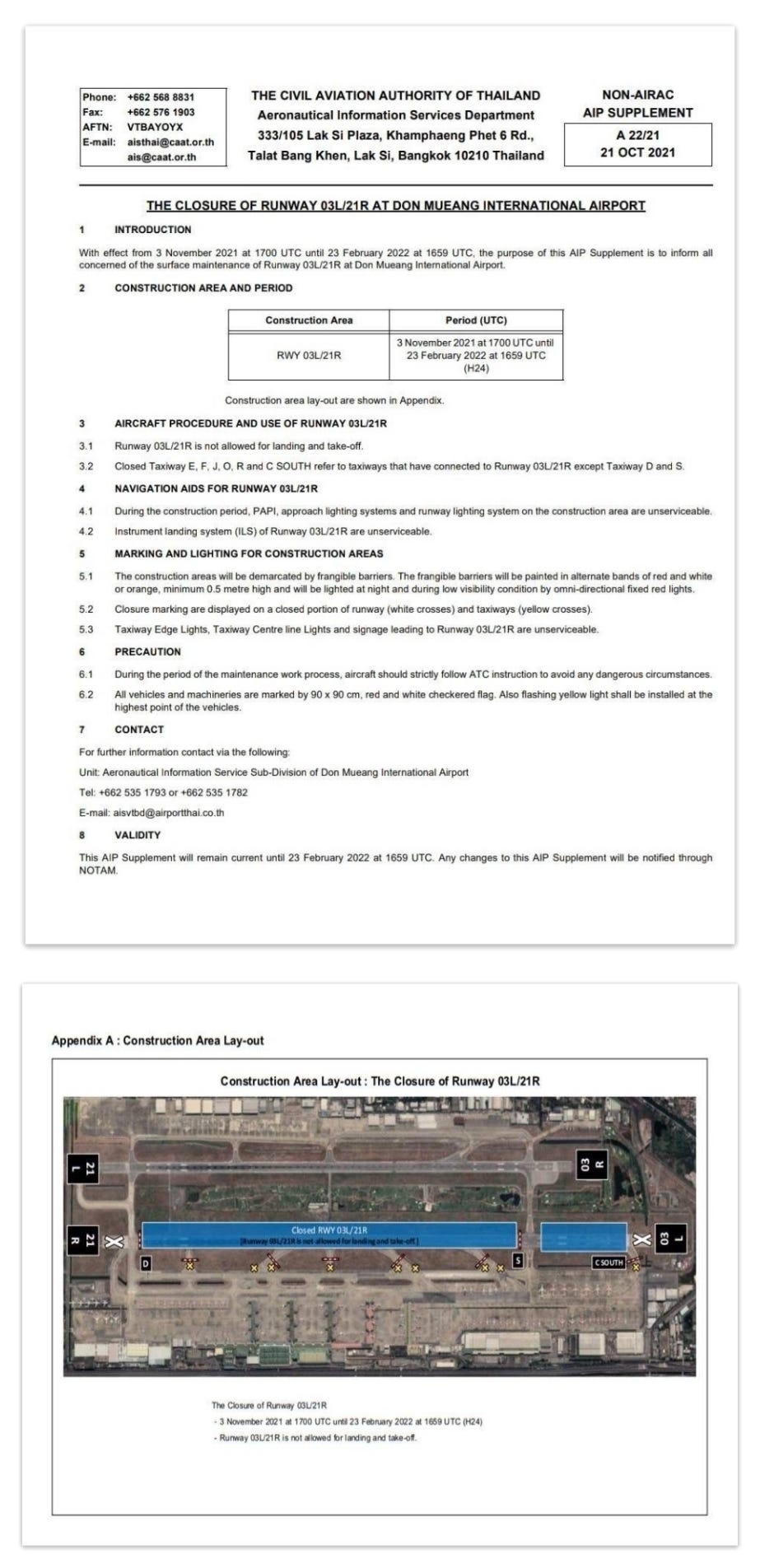

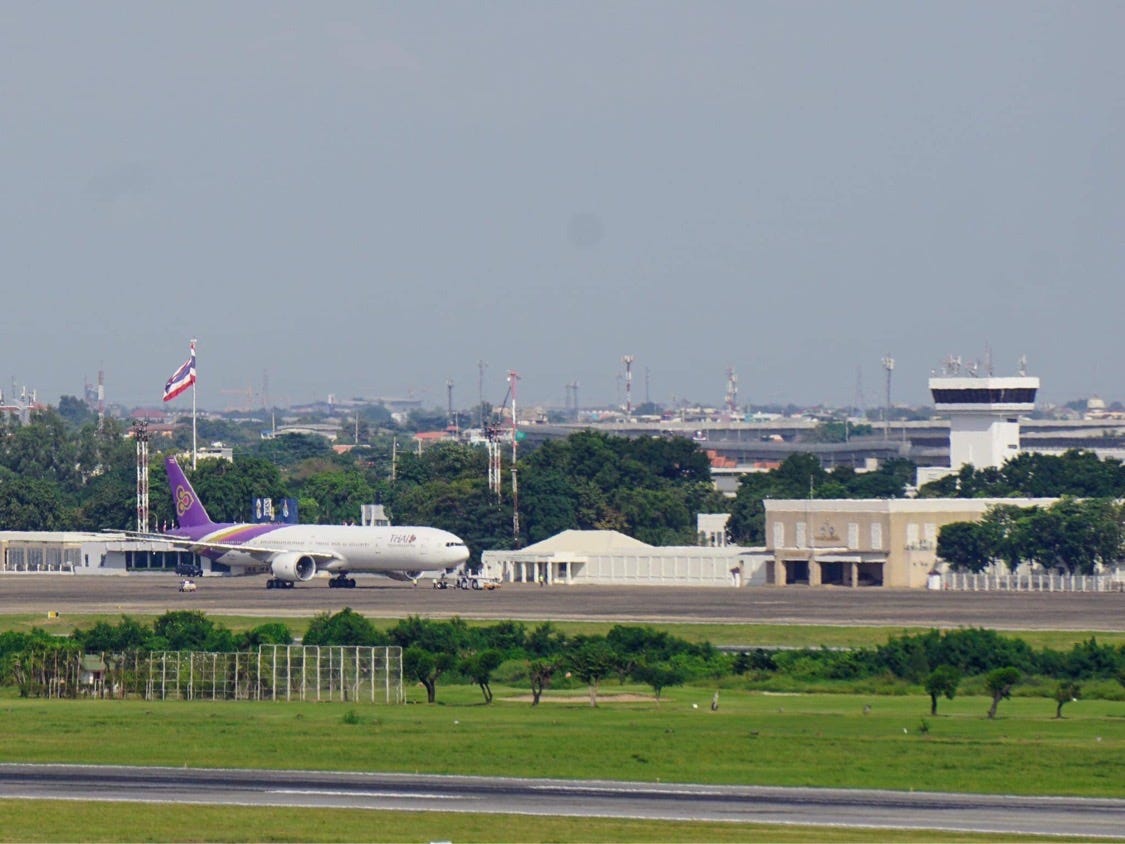













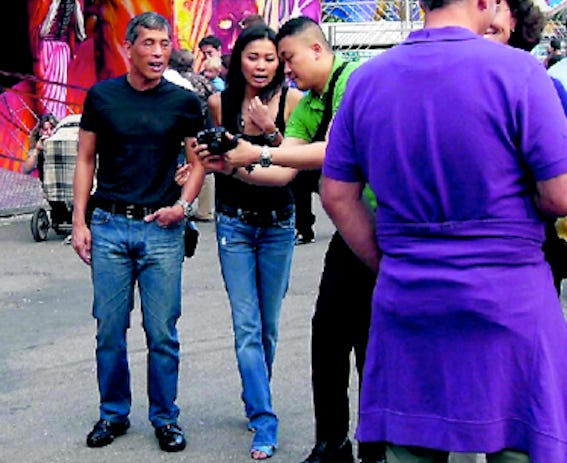

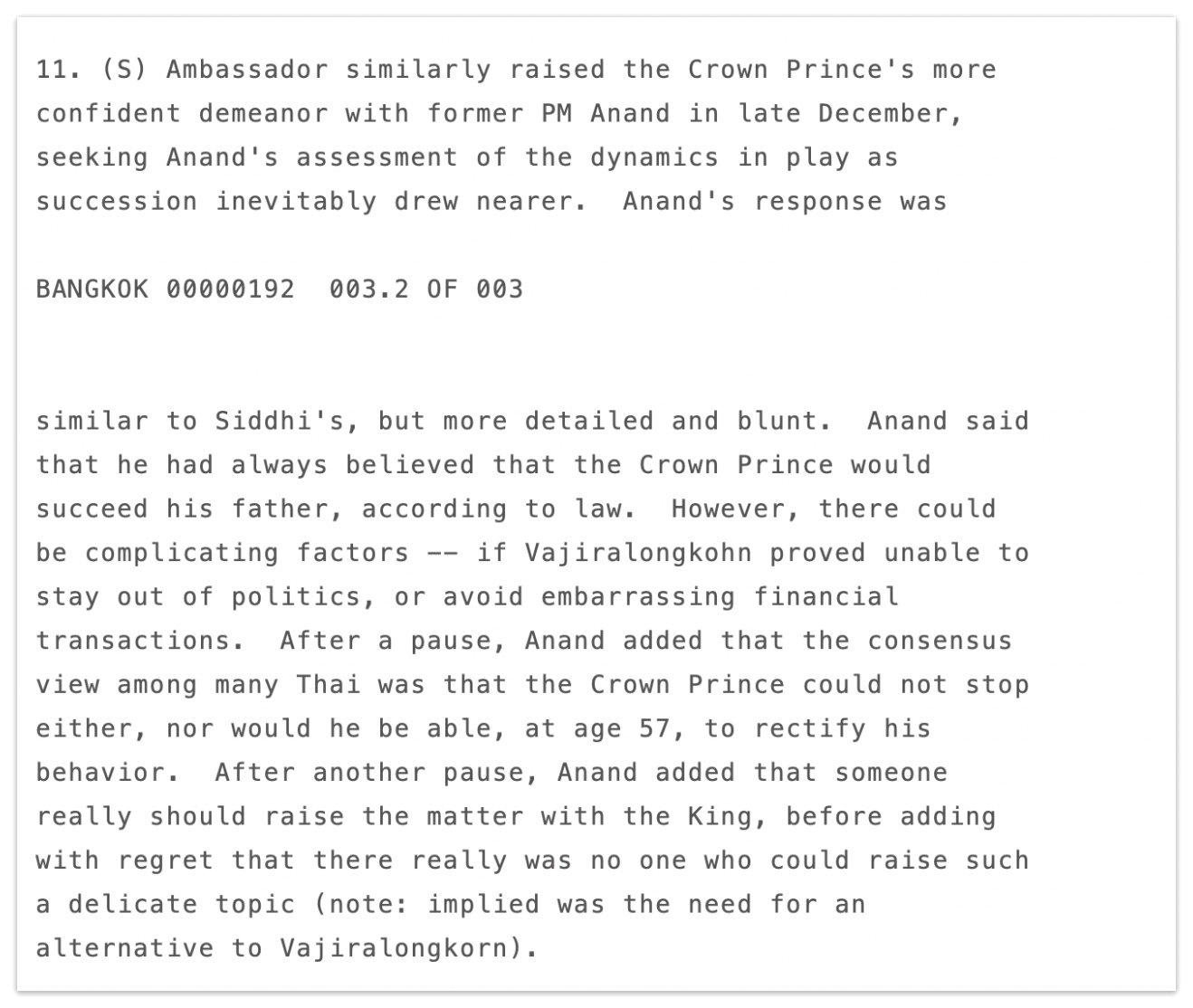










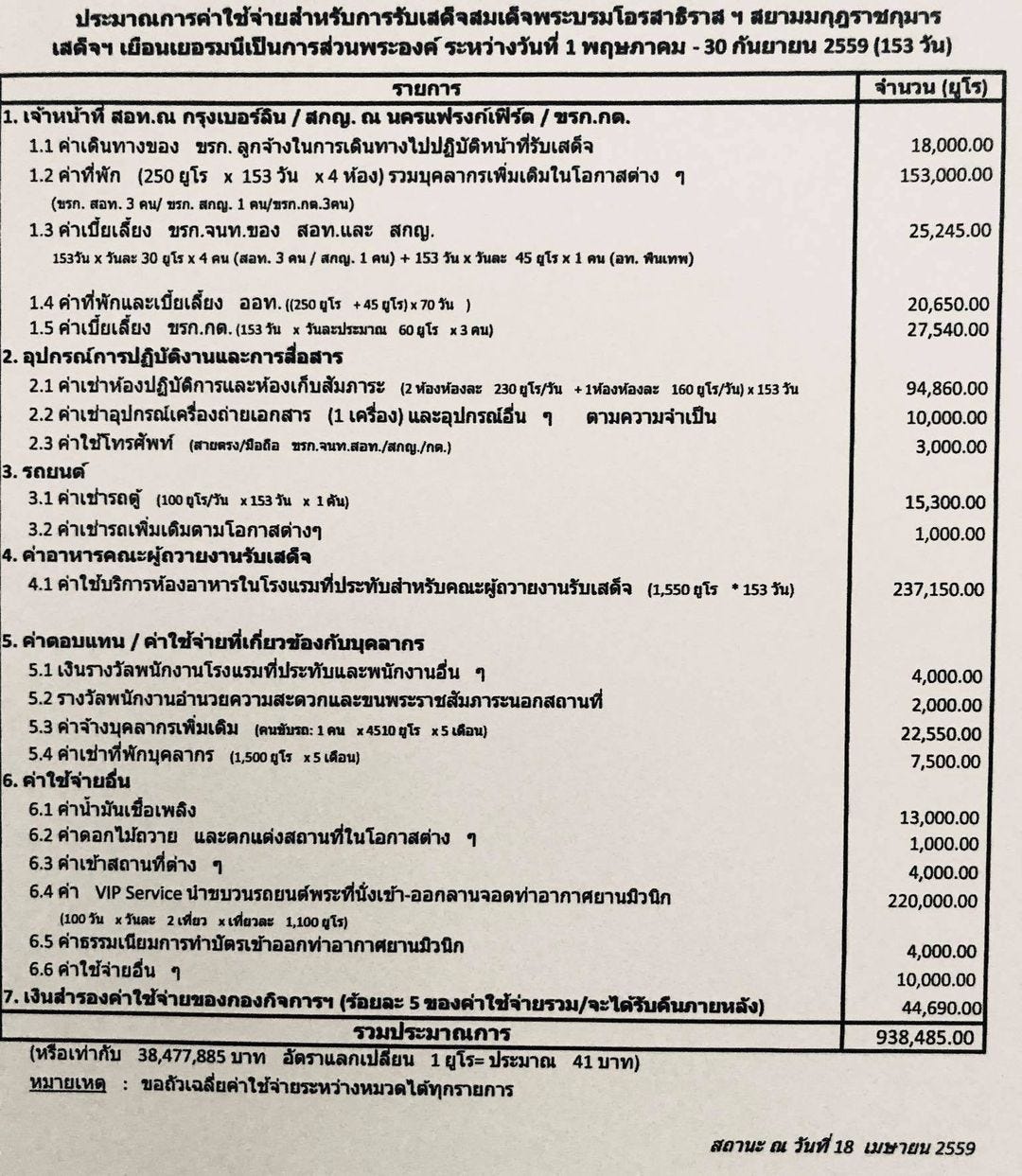


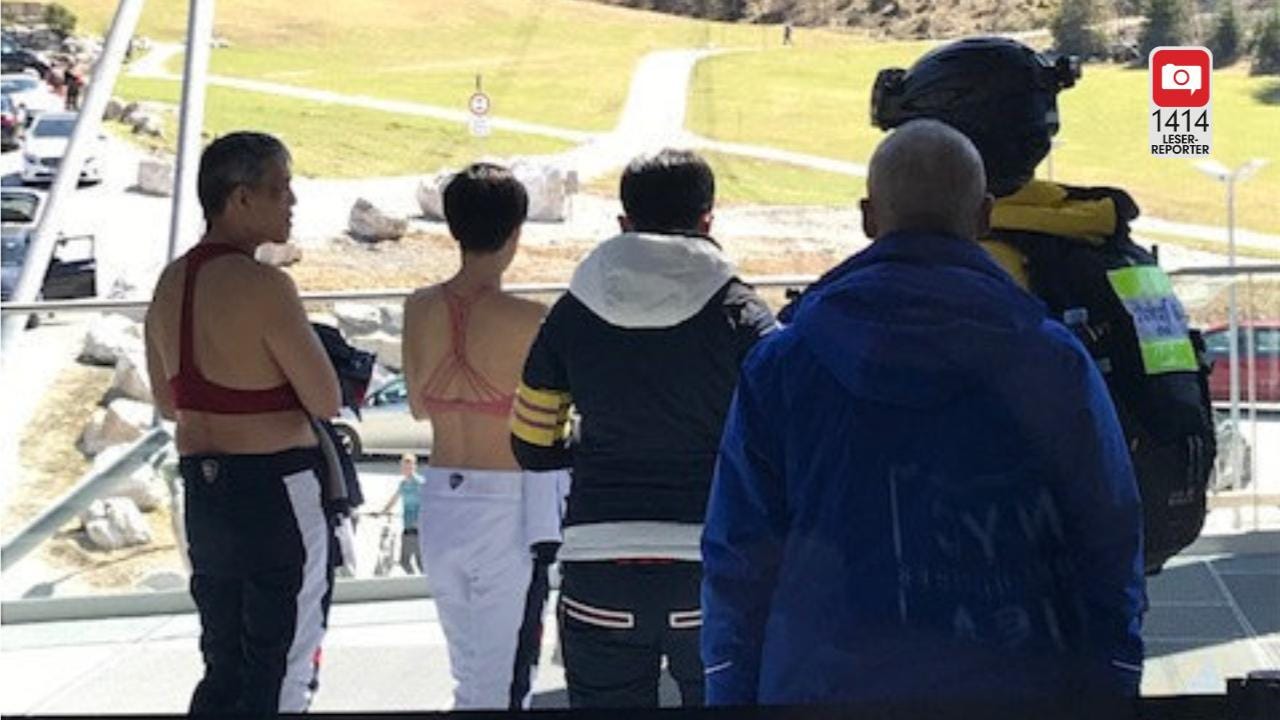

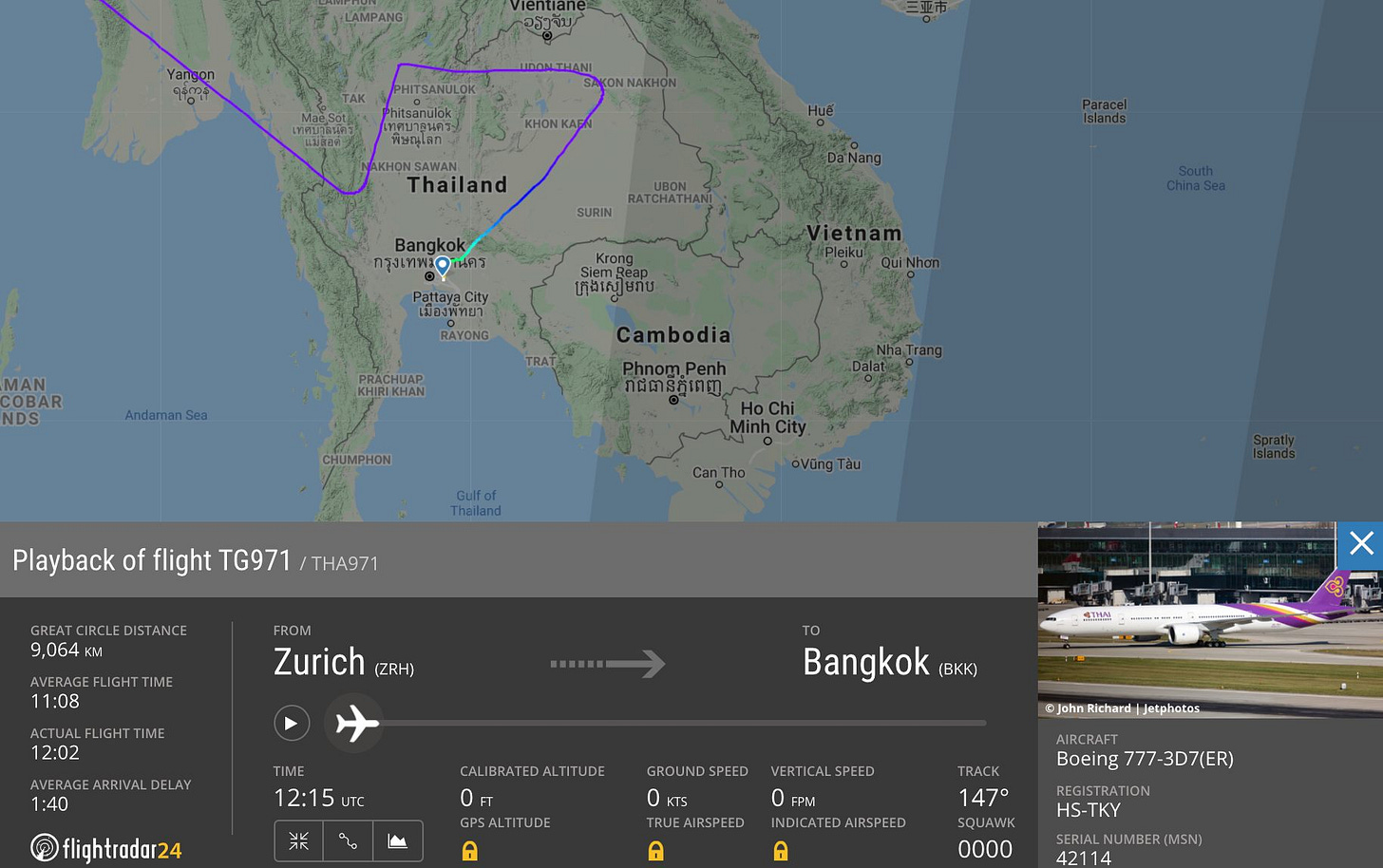


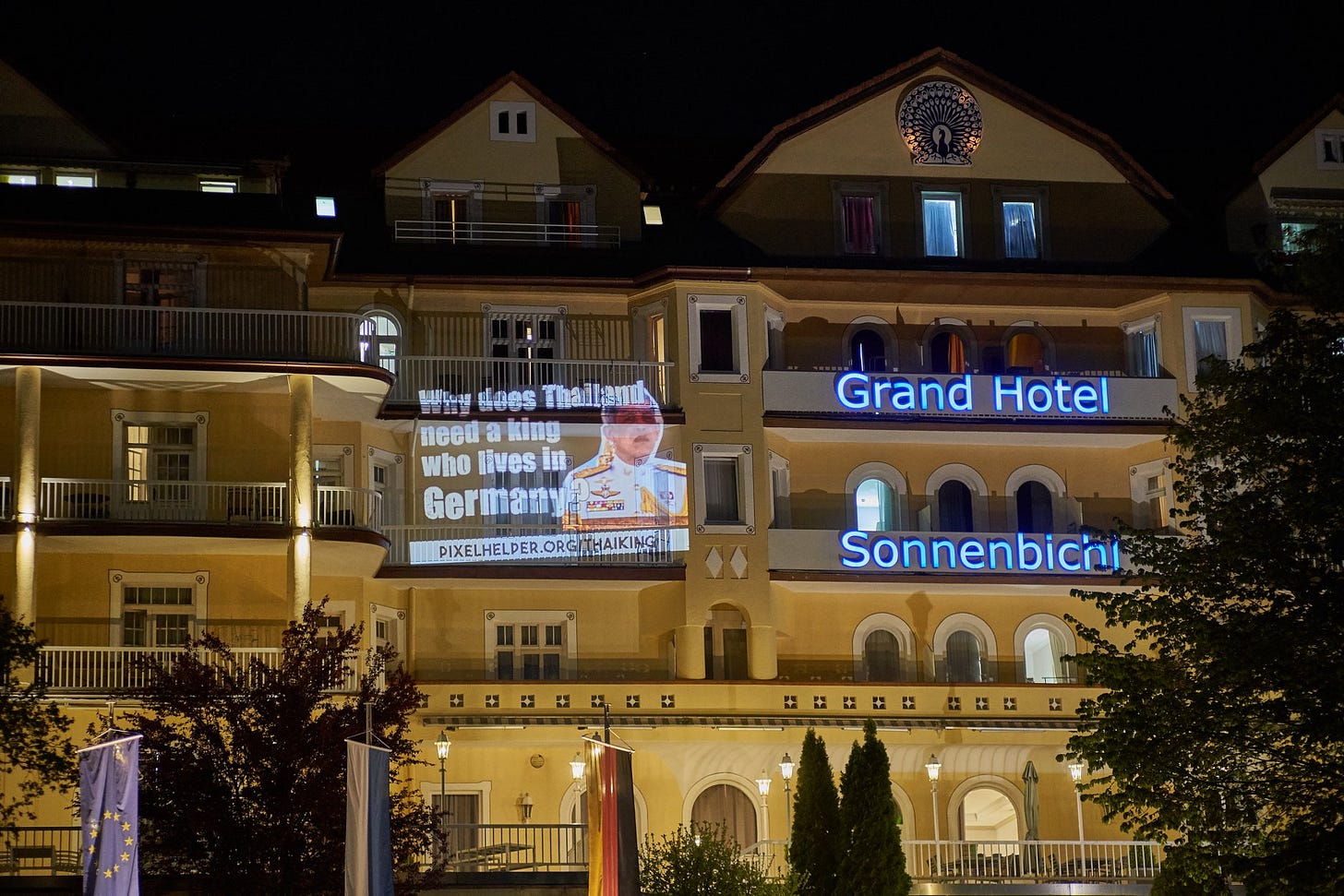
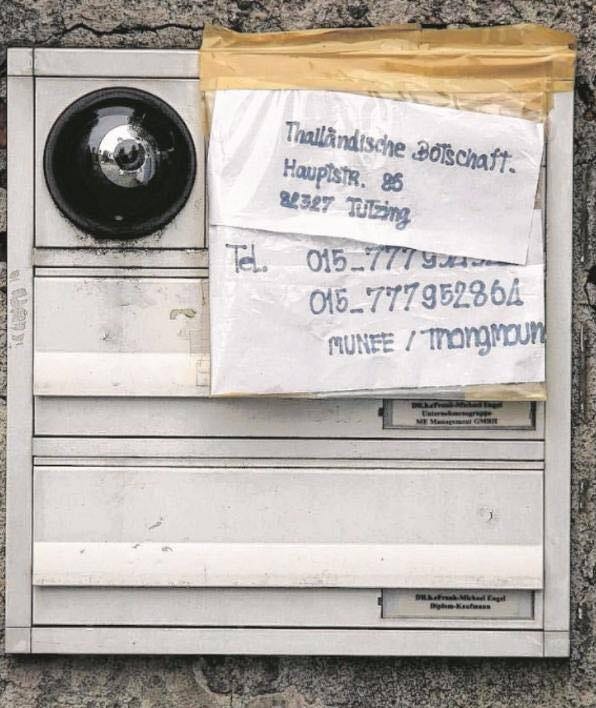


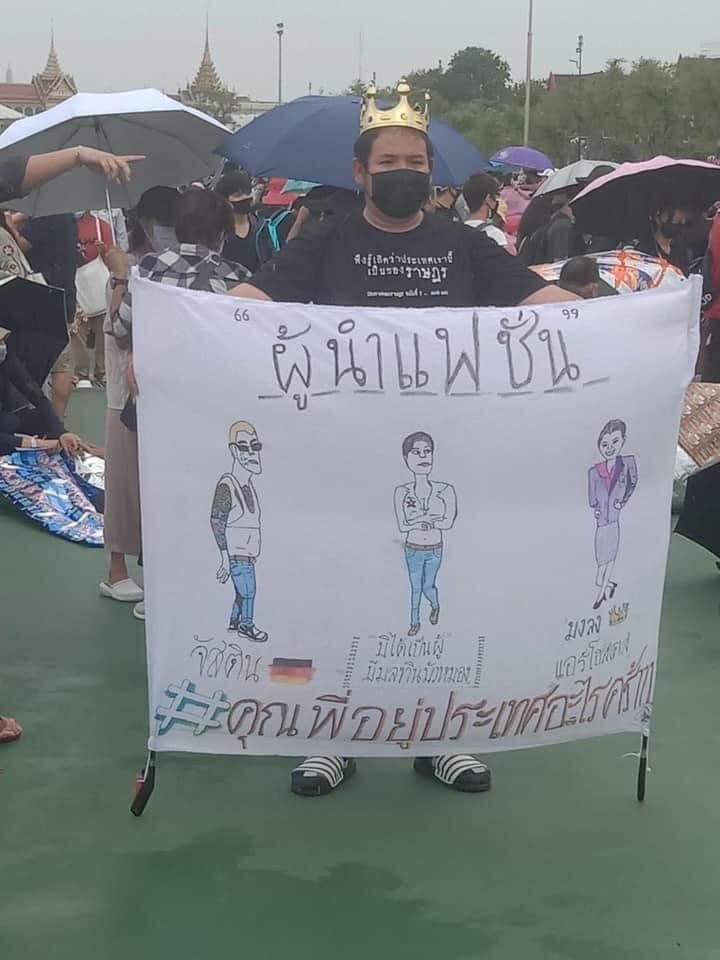

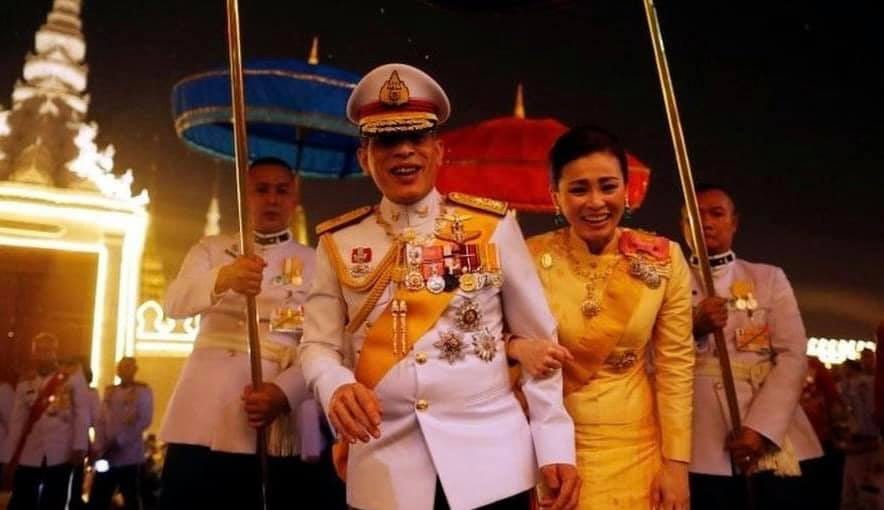


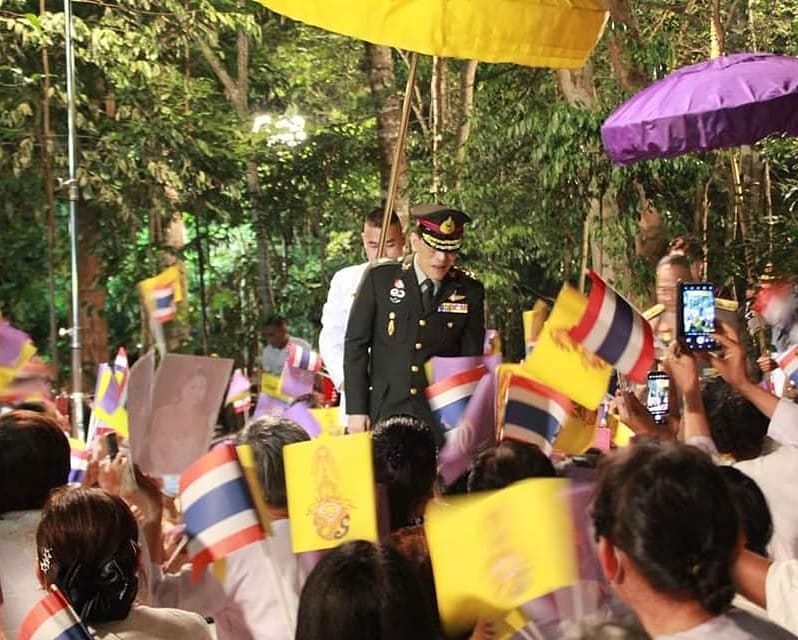
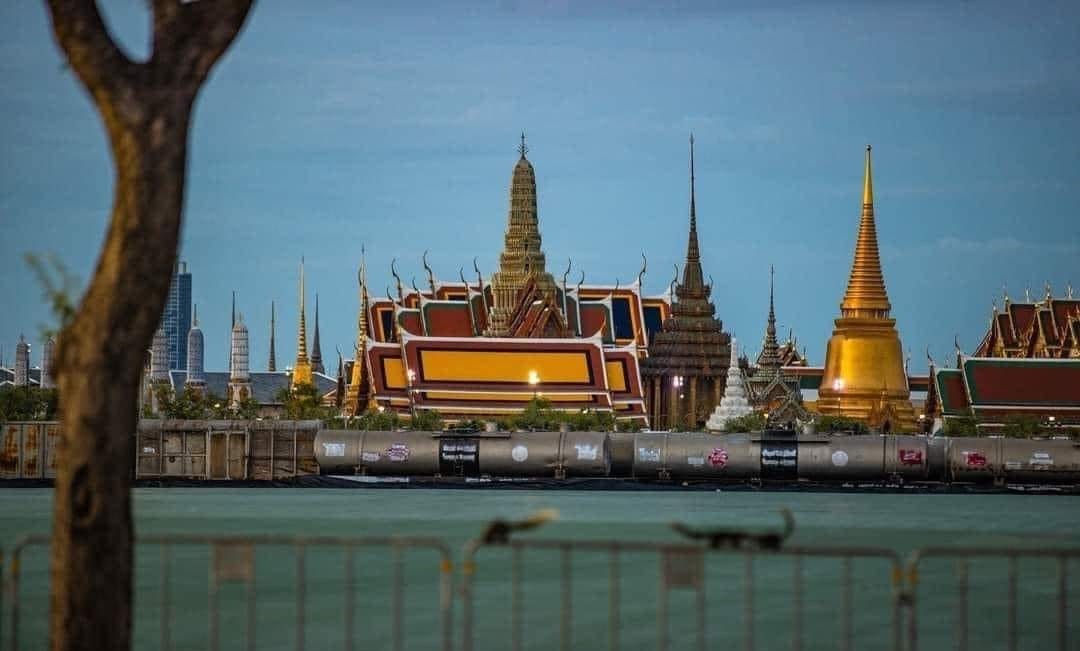



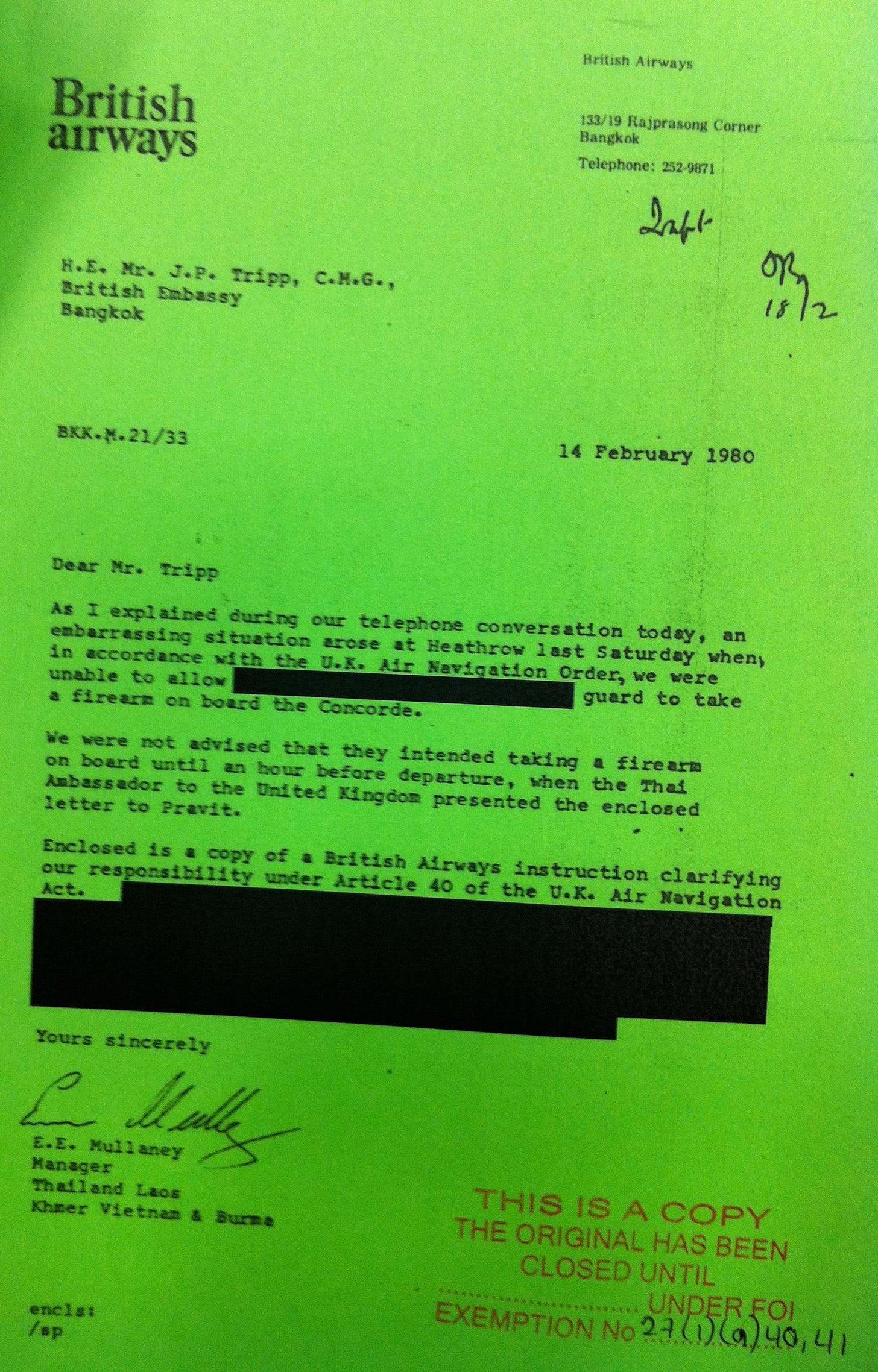
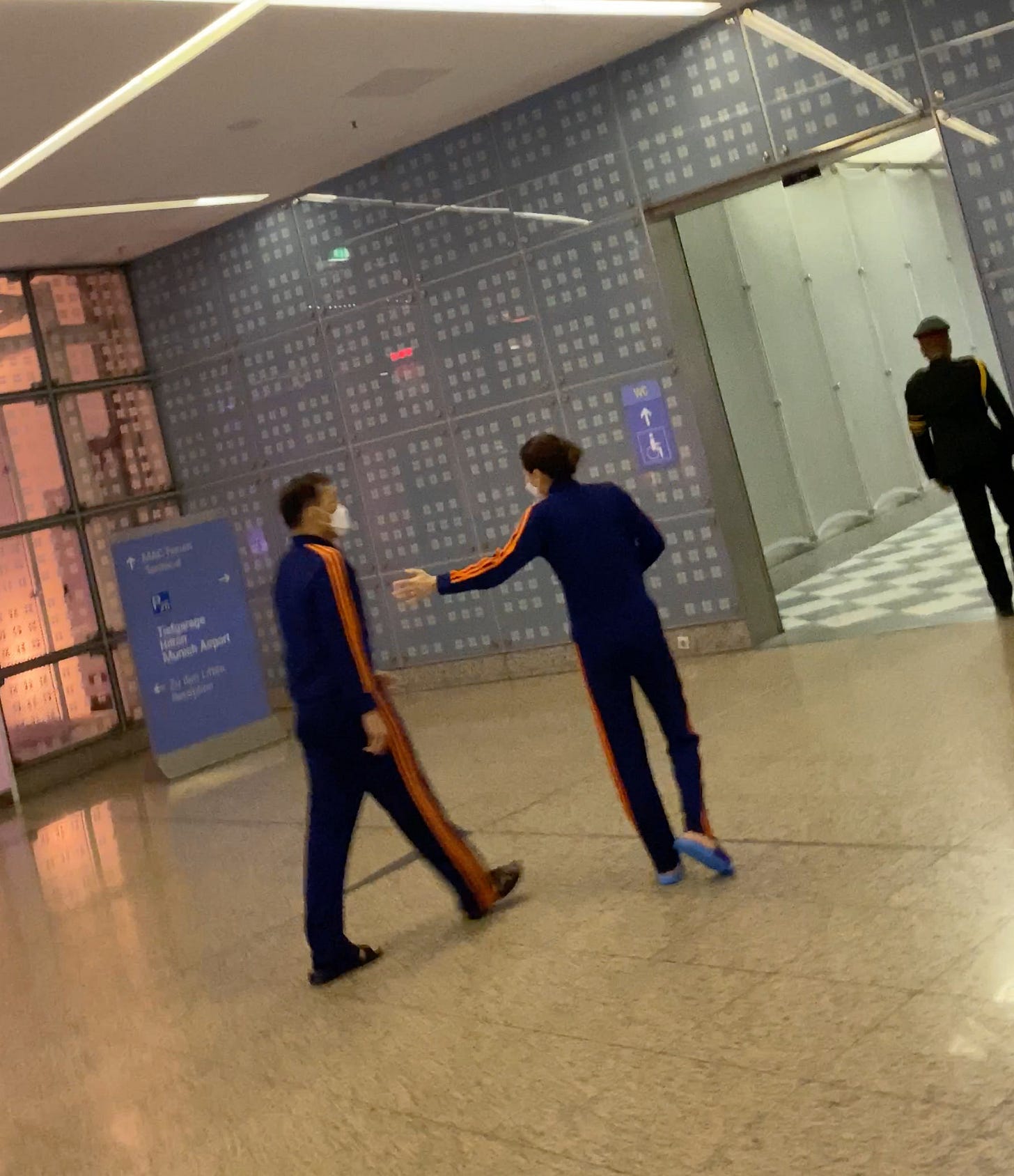


Absolutely cracking tale Andrew - off the scale of crazy and what a movie it would make if anyone outside of the Thaiosphere cared about it.
Yeah, Mr.Andrew MacGregor Marshall. Thank you very much for your devotion and tireless effort to reveal these above information to us all krub…😿❤️🌎👍🇹🇭